#the character writing and casting makes up for so many of the other flaws
Explore tagged Tumblr posts
Text
Vexting’s Official (Unofficial) Tier-List of the TKD Cast

I’ll break down my reasonings below the cut.
S-Tier
For me, these are characters that steal the scene whenever they’re in it, for me. I live, breathe, and eat this character up.
Rui Mizuki - is it really a surprise that Rui is at the very top? He has stolen my heart the first time I laid my eyes upon him. There’s something about a blond man that has ties to a deadly touch that just gets me (hello Prosciutto). But- in all honesty, I just love how deep and complex he feels, to me. He’s profoundly tragic all while masking it with an air of being overly friendly and helpful. I could honestly write an entire dissertation of this character (and I plan to). But I’ll save that for another day.
Leo Kurosagi - A polarizing character for many. I do think he gets a lot of hate compared to other equally offending characters. But aside from that, I really actually enjoy Leo. Sure, he’s an ass at times. But he really strikes me as someone who is so deeply insecure but refusing to let others know any of his weaknesses so he comes across as an asshole. He DOES do assholeish things. He reminds me a lot of younger me, as well. So biased. And yeah- I was a shit person. But growth, ya know? Anyways. Leo does have redeeming qualities. He does try to help Alan and look out for him (when he refuses to give the original copy of the case file but made a copy to give) as well as trying to make sure Tohma doesn’t take advantage of him. Not to mention making a literal app for Sho’s food truck. He DOES care. He shows it in his own way. And yeah, he’s a prick. But ya know- I just don’t see him as the worst offender (‘realistic’ or not).
Ren Shiranami - Ren is unironically fucking FUNNY. Dude is trapped in a clown world. Forced to wear the most atrocious outfits while trying to just keep to himself. He’s really trying to keep out of things and I love that for him. Also his SSR standard is my favorite standard. And he’s beyond expressive. I just love this guy.
A-Tier
This category are characters I greatly enjoy for one reason or another. They don’t quite make the cut into the S rank for one flaw or other. But, they’re still pretty solid in my eyes.
Ed Hart - He fucking cracks me up. I’m not into the whole vampire trope thing but he subverted my expectations by being the most cringe crackpot theorist I’ve ever laid eyes upon. I adore and despise him at the same time. He’s only not higher simply because it’s Ed. He just- can’t go any higher.
Yuri Isami - This newest chapter really bumped him up to top 5 territory for me. I love me an overconfident guy who’s clearly overcompensating. I won’t say anything else. But iykyk. He really shot up from like C-Tier to A-Tier.
Haru Sagara - Haru is fucking hilarious and he bounces well off of Ren. He zips about and is unapologetically a nuisance to all. Though, sorry Haru, you stay in A-Tier because you do have a few things that kinda make me go ‘hmmmmm’ for a second. And I can’t put my finger on why, just yet.
Ritsu Shinjo - One-track minded and really stuck in a single line of thinking. He’s hilariously wrong and doesn’t even realize it. I mean he’s not ALWAYS wrong, obviously. But- the fact that he’s so over-confident to the point of ignoring anything else anyone says kills me. A-Tier if only because of association with Taiga. And also his pretentious hand on chest pose that he has all the time in (most) of his cards. Get outta here ya failure.
B-Tier
These characters are one I feel positively towards but I don’t think too much on them. They’re ones that I do enjoy seeing but I don’t get beyond excited when they pop up. Still, it’s an enjoyable time, all the same.
Haku Kusanagi - I’m feeling positive about Haku but there’s still not enough there for me to push him up or down. I do like what I’m seeing, though. And I love his warding card with Rui. It’s hands down my favorite card in the entire game. In fact, I love his dynamic with Rui so far and I really hope we get to see more of them together. He’s- very similar to Rui, I feel. Only slightly different. But that’s a topic for another day.
Zenji Kotodama - Good god. First of all, he has the literal best SSR character card in the entire game. IYKYK. That shit EATS. In fact, Zenji EATS. He’s a fun character with enough tragedy to balance him out. I would feel so safe and included around Zenji and he’s honestly a great guy with killer fashion. I adore him. He’s only lower because I do want to see more of him. Truly. More dynamics. I want to hear what others thought of him before he passed.
Jiro Kirisaki - Jiro is growing on me and may see some upwards movement in the future. He’s interesting enough to keep me invested but doesn’t seem to also hog up screen time, either. He’s a solid balance of being there and present and impactful but also- not in your face about it. I am so curious about him. And because there’s a LOT of mystery there, I’m keeping him here for now. But I have a feeling he’ll see some upwards movement on this list.
Sho Haizano - Sho and I would 100% throw hands. But then we’d both laugh it off, I think. He’s a bit too passive for my liking. But I can respect a man with a good truck and passion for food. As a fellow food man, myself. Sho, you’re solid there. But wash that bandana, please. He’d be higher. But- again- his passive nature makes it hard for me to place him higher than he is.
Alan Mido - Alan is a comfortable character. He’s comfortably there. But the lack of information makes it hard to place him higher, for me. I do imagine he gives some of the best hugs, though. I feel like I need an Alan hug in my life. Truly.
C-Tier
Characters placed here are ones I feel a little indifferent towards or feel a bit annoyed if they’re on the screen (depending on the context). But they’re not irredeemable in my eyes. Just characters that I personally can’t rank higher at this time.
Kaito Fuji - Kaito, you have been ALL over this list, haven’t you? From A-Tier to D-Tier to slowly moving comfortably towards the middle. He has some amazing screen time. And has two really sick fucking cards. But the constant on-screen screaming KILLS him for me. I don’t mind the boy failure aspect. I think it has its charms. But I actually have to mute my game because of him.
Romeo Lucci - Romeo, you’re really only so low because of exposure exhaustion. You’re everywhere. He has his charms, for sure. I can see why he’s appealing to some. He cracks me the fuck up because he’s so exasperated. I’m just- also kinda sick of seeing his face is all. One day, I’m sure you’ll shoot up higher.
Jin Kamurai - Jin was solid D-Tier for a while for me but after doing my character study of him, he’s been slowly going up. I don’t care for his character trope. The cold/callous CEO(esque) son who actually has a soft spot for those he cares about. Ehhh not my type. He tries too hard to be hard and it’s- kinda lame. But- I also like this pathetic side of him that’s untrusting and afraid of being betrayed again. He has some interesting aspects so we’ll see where he winds up on this list in the future.
Lyca Colt - Lyca isn’t BAD. Per say. But I’m not a fan, at all, of his werewolf form. It just- looks stupid. It looks BAD. And I can appreciate that others like him. But that really took me out. In a negative way. Now. Lyca has some sweet traits about him. And I do teeter on liking him and hating him. So he has a chance.
Subaru Kagami - I do not trust this fucker at all. I would hate him in real life, too. He sets off alarms in my head. I know he’s an actor and it’s not really a surprise that he’s putting on an act. But something about him makes me feel physically nauseous. He’s not in D-Tier if only because he does have some nice interactions and I bet he’s a pretty crier.
D-Tier
If I placed a character here, it’s because there’s just something I greatly dislike about this character. It is a personal opinion. I don’t hate them. But until the game gives me a reason to move them up, they remain here.
Tohma Ishibashi - I can see the appeal of him to others. But he comes across as so slimy. I also just cannot take anyone serious who has their monocle pierced to their fucking ear. Or even just wears a monocle. Okay cartoon ass villain.
Lucas Errant - Stale bread. He’s the ‘safe’ option. And- again, I see why people see the appeal in him. He has cute moments. But I just find him to be a scene drainer. Anytime he’s on screen I suddenly feel myself losing interest in the game.
Towa Otonashi - Towa is interesting. I’ll give him that. But he also comes across as the type to really idealize what romance is. He just gives me major ick vibes. I do look forward to learning more about him, though. And he is very cute. It’s just that personality kinda kills it for me. Anyone who has an idealized version of someone else instead of seeing them as a person with flaws feels extremely just….. gross to me.
Taiga Hoshibami - I understand why people like him. People like unhinged bad boys who give no fucks. And good for them. Not my cup of tea. But my biggest issue with Taiga is exposure exhaustion. I’m so fucking sick of seeing his face to the point that every time I do see him I roll my eyes and find my mood instantly decrease. They better do something actually interesting with him soon because I’m really getting sick of him.
33 notes
·
View notes
Text
Fallout was pretty damn all right-- some of the action sequence resolutions seemed a little silly/outcomes were far fetched but I liked it, and am anticipating season 2. I really love the separation of Max and Lucy, knowing their attachment to each other, and the idea that they're going to be in a place of conflict. I like that we got to find out Cooper is still looking for his family, even though his wife and her position seems so questionable-- I like that it's left open-ended where his situation in the past actually ended up with her. But we know he ends up defamed based on the opening scene so I wonder how that happens. But as is very on brand, my favorite thing by far was Moldaver and Rose, and I will spend some time staring at them and their relationship and Moldaver's attachment to Rose under a microscope.
#not bad at all#the character writing and casting makes up for so many of the other flaws#fallout spoilers#one of my least favorite things was the approach to political topics and how it translates into the real world but oh well#also laszlo was there
2 notes
·
View notes
Text
Pick One: Magical Girl Show or Rom-com. You cannot be both.
Early in season four we get the episode Gang of Secrets. An episode that ends with Marinette outing her secret identity to Alya. A touching moment that sparked outrage across the fandom because it meant that Marinette had made the choice to reveal her identity to her best friend while keeping her hero partner in the dark.
This choice spat in the face of the exceptions that many fans had for the series. Thousands of pre-season-four fanfics feature moments where Ladybug and Chat Noir promise each other that they'll be the first to know each other's identities. After the Alya reveal, scores of fanfics were written to salt on Marinette's choice to tell the "wrong" person.
Most of these fics feature a betrayed Chat Noir quitting or otherwise punishing Ladybug for breaking their promise to be each other's first, thereby destroying his faith in their partnership. But that promise was never made on screen. It only existed in the realms of fanfic and, when Chat Noir finally found out in canon, his reaction was largely neutral. He never once blamed Ladybug for her choice or pushed for a reveal or even asked for the right to tell one of his friends.
So what happened here? Why did the fans have such wildly unrealistic expectations of canon? Were their expectations even unrealistic or did canon betray them? The answer to that is not as straight forward as you might think because it all comes back to one of Miraculous' many, many, many writing problems: Miraculous is trying to be both a Magical Girl Show and a romantic comedy, but those are not genres that mesh. You can only be one (or you can be a third thing that we'll get to at the end as it's the easiest way to fix this mess, but I want to mostly focus on where the anger is coming from and why the writing is to blame.)
To discuss this mismatch, we're going to do something that breaks my heart and talk about some of Origins flaws. While I love that episode and unironically refer to it as the best writing the show ever gave us, it's not perfect and its flaws are all focused around trying to set up both genres. Do note that I'm going to use a lot of gender binary language here as magical girl shows have a strong focus on gender segregation and rarely if ever acknowledge gender diversity.
Let's Talk Magical Girls
Magical girl shows are shows that center on young women and their friendships. While male love interests are often present in these shows, the boys tend to take a backseat and function primarily as arm candy while the girls save the day and carry the narrative.
A great example of this is the show Winx Club. This show features a large cast of teenage girls who save the magical universe from various threats with their magical powers. Each girl has a love interest, but the boys are usually off doing their own thing and only occasionally show up for a date or to give the girls a ride on their cool bikes or magical spaceship. I don't even think that we see the guys fight or, if we do, it's a rare thing. They are not there to save the day. They are there to be shipping fodder.
Like most magical girl shows, Winx Club starts with the main character making friends with one of the girls who will eventually become part of her magical girl squad. This brings us back to Miraculous.
Did you ever find it weird that Origins implies that Marinette has no friends? She doesn't even have a backbone until new girl Alya shows up to become Marinette's First Real Friend:
Marinette: I so wish I can handle Chloé the way you do. Alya: You mean the way Majestia does it. She says all that is necessary for the triumph of evil is that good people do nothing. (pointing at Chloé) Well, that girl over there is evil, and we are the good people. We can't let her get away with it.
This is a bizarre opening because Miraculous is not about Marinette making friends or learning to stand up for herself. If you skipped Origins and just watched the rest of the show, then you'd have no clue that Marinette wasn't close with her classmates before this year. You also wouldn't know that Alya was new in town and you definitely wouldn't know that Marinette had never stood up to Chloé before this year. So why is this here? Why waste screen time setting up elements that aren't actually important to canon?
Miraculous did it for the same reason that Winx Club did it: magical girl shows traditionally start with the main character making friends with at least one of her eventual female teammates because Magical Girl shows are all about the girls and their relationships. The boys are just arm candy.
But Miraculous isn't a magical girl show. The writers have explicitly stated that it's a rom-com and romantic comedies aren't about female friendship. They might have female friendships in them, but that's not where the focus is. The focus of a rom-com is on the romance and Origins is very clearly all about the romance.
Origins as a Rom-com
Origins has a lot on its plate. It has to establish the villain's motivation for the first time, show us how the heroes got their miraculous, show us how the heroes first met on both sides of the mask, show us how they met their respective best friends, and show us how the heroes dealt with their first akuma. It would be perfectly understandable if this 40 minute two-parter didn't do anything with the romance. They have a full show to give us that!
In spite of this, Origins has some incredibly touching moments for both Ladynoir and Adrienette because romance is the heart of Miraculous. It is the main focus of the show. The driving motivation for both of our leads and the majority of the show's episodes. To tell the story of how their journey started without at least one of them falling in love would feel wrong. That's why we see both of them fall in love!
First we get Chat Noir giving his heart to his bold and brilliant lady, then we get Marinette's heart being stolen by the shy sweet boy who never once thought to blame her for her snap judgement of his character. We even get a touching moment where Chat Noir inspires his lady to accept her role and be Ladybug, leading her to boldly face their enemy and call him out:
Roger: I have a new plan, unlike you! Move aside and let the pros do their thing. You've already failed once! Ladybug: …He's right, you know. If I'd captured Stoneheart's akuma the first time around, none of this would have happened! I knew I wasn't the right one for this job… Cat Noir: No. He's wrong, because without you, she'd no longer be here. (they look at Chloe) And because without us, they won't make it, and we'll prove that to 'em. Trust me on this. Okay? Ladybug: Okay.
I love this moment, but it does lose a little of its power when you remember that we had an Alya-driven variation of this exact same thing five minutes prior:
Alya: HELP!! (Marinette suddenly gets filled with courage. She gets the case out of Alya's bag and puts on the Miraculous. Then, Tikki appears, happy to see Marinette again.) Tikki:(raising her arms) Mmmm! Marinette: I think I need Ladybug! Tikki: I knew you'd come around! Marinette: Well, I'm still not sure I'm up for this, but Alya's in danger. I can't sit back and do nothing.
This scene initially confused me because - if Miraculous is a rom-com - then why would you make Alya the reason that Marinette became Ladybug? Why wouldn't you have Chat Noir be the one in danger so that Marinette chose to fight because of her love interest and then encourage that bond with the later scene of him encouraging her? Why split the focus like this? Why give Alya so much attention?
In case you haven't figured it out, it's because Origins is trying to establish two different genres of show. Two genres that will continue to fight for the rest of the series (or at least the first five seasons).
Magical Girls Vs Rom-com
Why is Alya the one to shake off the nightmare dust and inspire the others during the season five finale? Why is Alya the one that Marinette trusts with all of her plans while Chat Noir is kept in the dark? Why does Alya and Marinette's friendship get so much more focus than Adrien and Nino's? Why was Alya the only temp hero who got upgraded to full time hero?
It's because Alya is Marinette's second in command in a magical girl show and magical girl shows focus on female friendships while the boys are just there to be cute and support the girls.
Why do most of Marinette's talks with Alya focus on Adrien? Why is Chat Noir the only other full time holder of a Miraculous for the first three seasons and then again for the final season? Why do Marinette's friends become more and more obsessed with Adrienentte as the show goes on? Why is the love square's identity reveal given so much more narrative weight than any other identity reveal?
It's because Miraculous is a rom-com and the love square is our end game couple, so of course the story focuses on their relationship above all else!
Are you starting to see the problem?
Circling back to our original question: no, it was not unreasonable for the fans to expect that the Alya reveal would have massive negative consequences for Ladynoir. That is what should happen in a rom-com and Miraculous is mainly written like a rom-com. But the writers are also trying to write a magical girl show and, in a magical girl show, Alya and Marinette's friendship should be the most important relationship in the show, so it makes perfect sense that the show treats the Alya reveal as perfectly fine because the Alya reveal was written from the magical girl show perspective.
When it comes to Miraculous, if you ever feel like a writing choice makes no sense for genre A, re-frame it as a thing from genre B and it suddenly makes perfect sense which is fascinatingly terrible writing! It's no wonder there are people who hate the Alya reveal and people who will defend it with their life. It all depends on which genre elements you've picked up on and clung to. Neither side is right, they've both been set up to have perfectly valid expectations. Whether those expectations are valid for a given episode is entirely up to the mercurial whims of the writers!
How Do We Fix This Mess
At this point, I don't think that we can, the show is too far gone, but if someone gave me the power to change one element of Miraculous, that element would be this: scrap both the magical girl stuff and the rom-com stuff and turn Miraculous into a team show where the friendships transcend gender.
At this point, I've written over a quarter of a million words of fanfic focused on these characters (the brain rot is real) and one thing I've discovered is that it is damn near impossible to keep Adrien and Alya from becoming friends. They're both new to their school while Marinette and Nino have gone to the same school for at least a few years. Alya and Adrien are both obsessed with Ladybug plus Adrien is a natural hype man who loves to support his friends and Alya loves to talk about her blog. Alya is dating Adrien's best friend. On top of that, Alya, Adrien, Nino, and Marinette are all in the same class, meaning that they pretty much have to be spending time together five days a week unless French school don't give kids a chance to socialize or do group projects. If so, then judging them for the first issue, but super jealous of the latter.
Given all of that, why in the world is does it feel like Alya is Marinette's close friend while Adrien is just some guy who goes to Alya's school? Along similar lines, while canon Marinette barely talks to Nino, I've found that Marinette and Nino tend to get along smashingly, especially if you embrace the fact that they have to have known each other for at least a few years.
If you embrace this wider friendship dynamic and scrap the girl squad, replacing it with Alya, Adrien, Marinette, and Nino, then the fight for narrative importance quickly goes away. It's no longer a question of is this episode trying to be a magical girl show or a rom-com? Instead, the question is: which element of the friend group is getting focused on today? The romance or the friendship?
A lot of hero shows do this and do it well. I think that one of the most well known examples is Teen Titans. That show has five main characters and the focus is usually on their friendships, but there is a very clear running romantic tension between the characters Robin and Starfire with several episodes giving a good deal of focus to their romance. I'd say that this element really starts in the show's the 19th episode - Date with Destiny - and it all culminates in the movie that capstones the series: Trouble in Tokyo. The character Beast Boy also gets a romance arc and, while it's more short lived, it's further evidence that you can have strong romances and strong friendships in the same show and even the same episode. You just have to own the fact that boys and girls can be friends with each other, a very logical thing to embrace when your show has decided to have a diverse cast of heroes instead of imposing arbitrary gender limitations on its magical powers.
I couldn't figure out a way to work this into the main essay, but it's relevant so I wanted to quickly point it out and give you more to think about re Origins. Have you ever found it weird how Origins gives both Adrien AND Marinette the "I've never had friends before" backstory and yet wider canon acts like Marinette has this strong amazing friend group while Adrien doesn't seem to care about making friends and instead focuses all his energy on romance? Why give both the protagonist and the supposed deuteragonist this kind of origin if it's not going to be a major element of the show? It makes so much more sense to only give one of them this backstory and then focus that person's character arc on learning about friendship.
#ml writing critical#ml writing salt#adrien deserves better#marinette deserves better#alya deserves better#nino deserves better#My queendom for a team show#I was promised a team show!#Why even give the boys powers if you don't want the boys to have screentime?
967 notes
·
View notes
Text
Writing a Story from Start to Finish - Guide
I see you guys in the tags and reblogs talking a lot about how you have a desire to write, but have no clue what to write about, or where to even start figuring that out. While starting any project can be incredibly daunting, I wanted to put together a little guide to hopefully make it a bit more accessible. Be warned, this will probably be a long post.
Step 1: Form an idea
All writing begins with this: an idea. Ideas can start as small as an object, or as big as a world or cast of characters. What’s important is that your idea genuinely interests you, and makes you want to explore it more.
There are a million ways to gain inspiration for ideas, but my favourite method is a sort of brainstorm/mind map of all the little and big things you find interesting. Any tropes, characters, places, concepts, objects, animals, other stories, etc. you love—write them down. Then, start connecting the pieces. Each connection is one concept or idea you could explore further.
If this doesn’t work for you, try using some writing prompts or check out 15 ways to spark new ideas.
If you are a planner, proceed to Step 2. If you are a pantser, skip to step 7.
Step 2: Create your Protagonist
Now that you have a sort of concept or inspiration to work off of, you need your main character. There are about as many ways to create characters as there are characters themselves, and each method is going to work better or worse for every writer.
At the barest minimum, all your protagonist needs is a Goal to work towards, a Reason for wanting it, and a Flaw that keeps them from having it right away.
These three things can form a baseline character. Consider what the thing they want, why they want it, and what’s keeping from it says about them as a person.
Rapunzel (from Disney’s Tangled) wants to see the ‘floating lights’ on her birthday. She wants to because she believes she will learn more about herself through seeing them. Her fear over disappointing and disobeying her ‘mother’ keeps her from it.
My favourite character creation technique is actually Here—it takes you through creating character in order to create story.
If that one doesn’t work for you, try this one. It is more focused on defining traits and figuring out the personality of the character first.
Step 3: Your Plot is your Protagonist’s Arc
As stated in the character creation technique I shared in Step 2, character is plot. By that I mean, the character’s journey is the plot of the story. We’re here to see the protagonist transform because of the circumstances incited in the beginning.
So to form a plot, we need to know who the character is at the beginning, and what they need to learn by the end.
Your character’s arc is A but B so C:
A – your character and their flaw
B – The conflict they go through
C – how they change
“Obsessed with success, Jenny Beech works tirelessly to earn the approval of her strict parents and graduate top of her class, but when the new girl in town pulls her into a whole new world of excitement and fun, she must stand up for herself against her impossible standards and learn how to be a teen again.���
This one sentence has everything we need to know about this story and character: “Obsessed with success (character trait/flaw), Jenny Beech works tirelessly to earn the approval of her strict parents and graduate top of her class (goal), but when the new girl in town pulls her into a new world of excitement and fun (conflict), she must stand up for herself against her impossible standards and learn how to be a teen again (change).”
If you have these three things, congratulations! You already have a story. If you’d like, you may begin writing it now (skip to step 8). Or…
Step 4: Theme
I did a whole post on theme you should check out here. Essentially, the big takeaway is that your theme is a lesson to impart to the readers—which means it is not a question, it is an answer.
For the example given above, our theme would likely be something like, “Teens need to balance their additional responsibilities as they mature into young adults with the joy of being young and having fun.” Or, “Friends and a close social network is more important than having the best grades.” Or, “It’s important to take frequent time away from work in order to maintain one’s humanity.” Etc. Etc.
Theme is conveyed through what your characters need to do to succeed (or what they do that causes their failure). If Jenny lets loose and suffers consequences for it in the end, we’re saying that she should have stuck to her studies rather than letting herself have fun. If she lets loose and is rewarded with a greater relationship with herself and her parents, we’re saying that was the correct thing to do.
Step 5: Outlining
Now that we have a plot and a theme, we can outline our story. An outline is like a roadmap of what you’re writing. It can be as specific or broad as you want. My outlines tend to follow this structure, and I improvise the little stuff in between, but if you need to get all your ideas within your outline, that’s good too!
Just make sure your notes make sense to you so when you need to know where to go next, you have a handy tool just for that.
Step 6: Worldbuilding
Worldbuilding is probably where you’ll spend the most time because there’s just so much. However, I also find it one of the most fun parts. The minimal thing you need to know is your world’s normal, and how that normal is disrupted in the inciting incident.
Jenny’s normal is school work and trying to impress her parents. The disruption is the new girl in town.
Rapunzel’s normal is the tower and her hobbies. The disruption is Flynn breaking in.
I did a more in-depth post on worldbuilding here, but the basics is just ask questions, explore consequences, and do plenty of research.
Which brings us to…
Step 7: Research
This can also be done after your first draft, but can’t be skipped entirely. It’s important when trying to convey experiences that may not be wholly your own, or unique perspectives, that you understand the context behind those things in the real world.
Once again, ask questions, talk to people, and remain open to what you find.
Step 8: We can start writing now
Now that you have all your planning ducks in a row (or have a good inspiration to jump from) it’s time to start writing! Either go from the outline you built, or just try out scenes. I have some tips for actually writing the dang thing that I’ll put here:
Let me know how your writing goes, good luck!
#writing#creative writing#writers#screenwriting#writing community#writing inspiration#books#film#filmmaking#writing advice#writing masterlist#writing a story from start to finish#novel writing#planning
3K notes
·
View notes
Text
Wolfwood is an underdog character screwed by social hierarchy and Japanese cultural subtext more ways than one: a messy half-assed write up.
This is me saying that Wolfwood is in no way the equivalent of 'white' or even near the top in terms of class even when viewed with a Japanese lens and there's at least a few threads you can follow that will lead up to that conclusion. So to try and (badly) cover this topic as best as I can, the sections highlighted in this post will be the following
Colorism and imperialism
Tribes and burakumin
Shintoism and the burakumin people
Wolfwood's entire fucking design
I explode
Colorism
So in short. Asia has a colorism problem on top of a racism problem, but people like me get really frustrated when a more American POV is applied to try and shoehorn the discussion into purely racism. The reason is: history.
So. Japan was super imperialist back in history. And so was China, which Japan took many inspiration from in terms of language, culture, and most importantly, governance.
In order for their particular system of governance to work, both China and Japan ended up having their own respective court systems where the aristocrats and nobility would spend their days indoors as they administer governance. (Or more accurately, to be so educated, cultured and refined as the world outside implodes.) Thanks to this system, there is essentially a walled garden system where the well-educated nobles would spend their time well away from hard labor like farming under the sun.
This meant there is a greater amount of favoritism towards fairer skinned people as opposed to tan, since it became a quick indicator of class and status. Bc only laborers tended the field under the harsh sun, and women got this especially bad, bc imagine her having to tends the field like a peasant. Gasp.
Anyway bada bing bada boom white skin eventually became so associated with beauty and status. The old poverb, "色の白いは七難隠す", or White skin covers seven flaws, refers to women with pure white (sometimes powdered) skin is attractive no matter what their physical flaw might be. Think Geishas and their job of entertaining at private events with a face full of white powder makeup.
This colorism also hits men less, but the idea of status stays.

...Wink. (To note the above gif here for a sec: IMO Vash doesn't qualify as desirable purely because he's a blonde. A foreigner. An Other. But the hiding flaws part might be worth chewing on.)
And now we suddenly are looking at some kind of a vague hierarchical system. And indeed, Japan has had a caste system of sorts in with varying degrees of social mobility depending on which era you look at. The lowest in some era were slaves. And even then, there is another class even lower than that, the Burakumin. Put a pin in this bc it'll be important in the next part.
Tribes and Burakumins
There are actually, in fact, different tribes in Japan even today. Current day, the well known ones are the Yamato people, who make up 98% of the population in Japan. Mostly fair skin, black hair. East Asian.
Then there are the Ryukyuans, who live mostly in okinawa with their own culture, and then the Ainus.
I don't want to get even MORE historical, but those two groups were conquered and forcibly had their culture identity, language, and even land stripped off them. Attempted to have loyalty towards the emperor instilled towards them at various points. One might think the presence of these two might mean that there were more tribes back in ancient Japan, and, yes, you would be right!
Many of them might have been assimilated into what we think of as Japanese people today. There are always variation in skin color, hair color and facial features alone if one pays attention even in Tokyo. Not all East Asian are fair skin and have straight black hair, but an overwhelming majority do. (plus hair dyes and perms wahoo. who's to know sometimes)
One example perhaps is this. Ever watched Princess Mononoke? Did you know that part of the story centers around Ashitaka, who is part of the Emishi tribe, who are a group who has been rebelling against the Emperor Yamato for 500 years? And so he shoots samurais on the regular?

So here's the rub: the Emishi were in fact a real indigenous group who were basically conquered and assimilated. Some did resist during the 11th century, with their villages/hamlet out deep into the north of Japan. They were of course, greatly outnumbered.
These people who resisted the rule all over Japan with different identities, names and culture and survived came to be called the Eta 穢多 (lit. abundance of filth). Later, Burakumin.
EDIT: Another class of people called the Hinin ���人 are also closely associated with the Eta. 非人 lit means non-human. Hinins were more criminals in the eyes of the law, as these are the people who did not pay taxes or commited crimes like theft etc. The status is hereditary, same with Eta.
Now I mentioned the Burakumins. Burakumin are written like this 部落民, and refer to a strongly discriminated class of people who live in discriminated villages/hamlet. The kanji though, literally translates to "People who falls outside of the order", or, "Outcasts". In other words, even though there's a caste system which basically at least recognizes people as part of a governing system, the Burakumins do not qualify to even as to be human in this system.
And indeed, some of these tribes who had their culture and identity stripped off them are not even people in the eyes of the ruling government. Today, the term refers to the descendants of these people, and they do encounter a lot of discrimination and abuse in their daily lives from social to work. It's so bad that parents do not tell their children of the ancestry to avoid discrimination. Also its possible to know if one is a burakumin just by checking family names and registers jsyk, since they were once location based.
EDIT: those judged to be criminals also become part of this group!
More info by a Japanese guy regarding current day burakumin problem here on youtube.
Oh and also, many burakumin ended up joining criminal gangs like the yakuzas. Put another pin in this.
Shinto and the Burakumin people
Preface: shinto is a very sacred religion to many Japanese people and is still actively practiced today. Be respectful and just know I'm being hyper specific about this singular aspect of shinto. It is a very old religion and history which is fascinating.
But to not talk about this specific topic would be to kinda miss what Studio Orange has been doing to Stampede Wolfwood so I'm just gonna do this super quick. A more indepth messy write up can be found here if you like.
Right. So. Like with many religion, Shinto was also used as a means to convince people to fall in line. One thing that Shinto has is the concept of spiritual dirtiness, which is generated upon contact with death, blood and disease. Being dirty would then draw evil spirits and invite terrible misfortunes, so being clean is important in Shintoism. So important that meat was considered dirty. (With the exceptions of game meat and the whole religion thing applied to them.)
It's so important that certain professions such as Butchers, Tanners, Gravediggers etc were seen as so terrible that no one but the etas, the burakumins would do it. This whole thing then reinforces the hierarchy. And meanwhile the rulers in their court and shinto priests could conduct rituals to purify themselves.
And for me, this is the most insane thing since dirty jobs like that must be done no matter what era it is. Just by being alive, people get dirty and there's no avoiding that.
Anyway. In Trigun and even Japanese media, this gets translated into what I would call The Tormented Ones Whose Hands Are Permanently Stained With Blood.

Nicholas the Undertaker was certainly an interesting choice of writing. At least imo.
FUcK
Ok now to recap. I've established that even without colonization and talking about (american pov) racism specifically, there are still very real elements of Japanese history that is too strong, too deep, to intertwined with classism to ignore.
This is the historical baggage of Japan's colorism. Whether or not if Wolfwood is a burakumin here is not the point, but rather that it borrows from that issue all of its influence in varying shades.
It's the erasure of ethnicity and culture in its totality, or to be so consumed by the bigger ruling group that this thread straight up disappears. And to be considered so unwanted that even their descendants today are considered dirty.
They abolished the feudal caste system in the 1800s by the way. Still dealing with like over a thousand years' worth of shit though.
Now I can finally talk about Wolfwood.
Wolfwood's entire character design and writing choice.
Since trimax wolfwood is the base, I'll start with that.


Dark(er) skin, sunglasses, a business suit and a kansai dialect.
All of those are significant.
Now remember that I've mentioned Fair Skin and Black Hair to be the most defining trait of an East Asian. Even people who say East Asian even casually have that specific image in mind. But Wolfwood with the exception of BLR has always been depicted as just slightly tanned especially beside Vash.
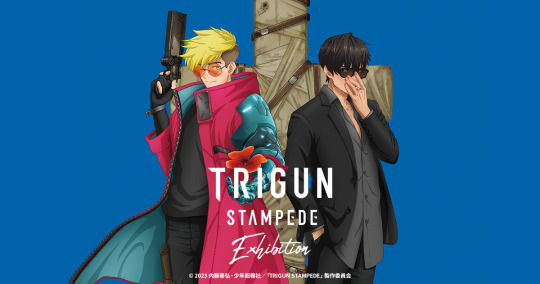
The shade fluctuates all the time depending on the artwork, but it's clear that the production staff knows the roots his character design is touching on in order to elicit that "otherness" from the Japanese audience. Which is all that above. The entire post.
Sunglasses and business suit also has a significance. One might think it's just the outfit of an average Japanese salaryman, and yes, that would be technically correct. More so though, this combo is also the outfit style of the Yakuza. Sans ties maybe bc Ww hates his organization.
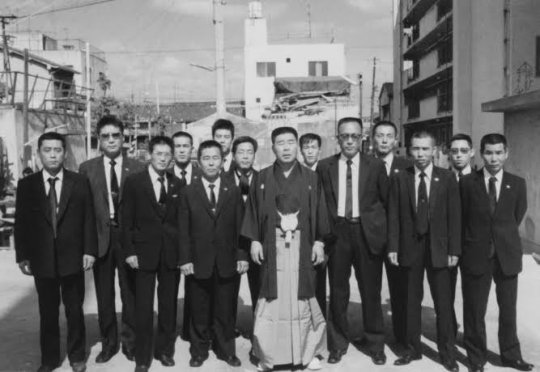
This is a picture of a Yakuza group known as the Yamaguchi-gumi. Their leader stands in the middle of this photo, the oyabun/father of the group, Kuzuo Taoka. More info and another rabbit hole here.
The Yakuza are a historically violent criminal gang whose membership often consisted of societal outcasts. Outcasts like the Burakumins, who due to their status in society could not find a proper job, and suffer abuse. Being in the Yakuza meant respect and status, and turned boys into men.
All that was needed is absolute loyalty to the leader, the oyabun or the patriarch of the group. If he says it, white is black and black is white. Disloyalty means to chop one's finger off.
If any of this sound even familiar.... Well, yeah. Unhinged criminal boss Knives and his merry Gung Ho Guns.

Next, kansai dialect. So, Japanese dialects are never properly taught when one attempts to learn Japanese. It's a thing that's not Standard and therefore unnecessary to learn. We learn the -desu's, -masu's, the keigo, but never the '-yan's', the 'eenen', the 'akan' or the chau's. (Or even the many other dialects out there)
I will now ask you to hold the idea that 'dialect' and 'language' can be interchangeable. The implications of the Standard Japanese is that it is the ruling class' language and the most proper form of it above all else. Seeing as the Capital of Japan is Tokyo, and their government centers there, it would not be stretch to also call Standard Japanese Tokyo Japanese.
Which means, Tokyo is the classy city and Osaka, the largest city in Kansai, is not as classy. Not as important. Not as well educated or hold as important of a place to the entire country.
It is also very common to hear Japanese people mask their dialect with Standard Japanese when they're in Tokyo, and then go back to their hometown and code switch. Because it's considered 'hick'.
Which, if you haven't considered is also a thing many of us do, I now present you the gift of this fun knowledge.
I Explode
In closing I hope this at least is interesting to chew on for anyone interested. It's by not means perfect and I might have gaps in my knowledge but fwiw, I hope it's at least fun.
Nightow has stated Wolfwood's ethnicity is ambiguous, which I would also interpret as him saying indirectly that Wolfwood is as valid an interpretation to see him as anything but a privileged guy having a good time in the story of Trigun.
It's possible that his ambiguity of roots is meant to simply elicit the idea of a "stolen child".

One fun thing I do consistently notice is that Fanon Wolfwood almost never is in a comfortable position in life even in AUs, and always somewhat broke. In both EN and JP. Which, yeah. Yeah.
There is intersectionality going on and I hope this post helps people see some of it at least. So thanks for reading! (sorry it got so long...)
Additional cool posts other people have written from their pov:
udon-tea's write up about wolfwood's unestablished canon ethnicity
interesting thoughts about tortoise matsumoto being the base and what they think of wolfwood's possible ethnicity
217 notes
·
View notes
Text
Beyond the Surface of Suo and Sakura’s relationship
**MANGA SPOILER WARNING**
This is my first post on this website, apologies if theres anything incoherent here. This post is also very simplified and lacks some information as I wanted to keep it as concise as possible. If you would like a full-blown analysis about their relationship, do let me know. I may consider making a complete writeup.
Contrary to popular belief about their “lack of interactions”, Suo and Sakura share many important and pivotal moments together scattered across the story. They may not have that big impactful moment compared to other dynamics in WBK (examples being Chika calling Endo by his full name, or Nirei yelling at Sakura in Noroshi, but we’ll get to that later), however they are important to their relationship and for their individual characters. There’s too many to list here, so I will keep it short.
From the start of Wind Breaker, Suo has always teased Sakura; even lying to him when they first meet:
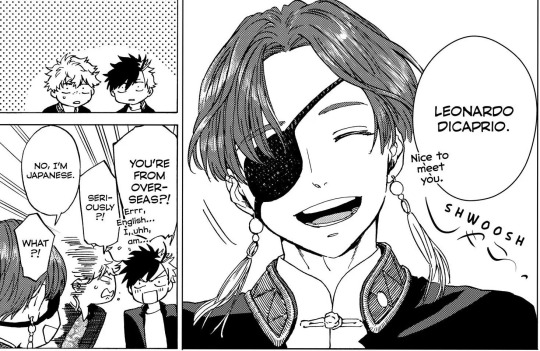
We all know that Suo is a very unserious guy, and this aspect of his character is highlighted the most when it comes to his interactions with Sakura. He constantly pokes fun at him; blatantly lying to him with the sole purpose to mess with him and just being a general tease.

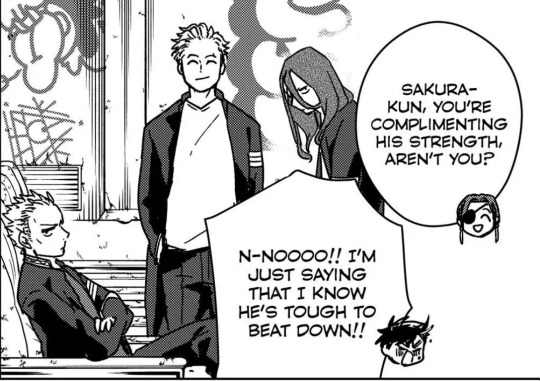
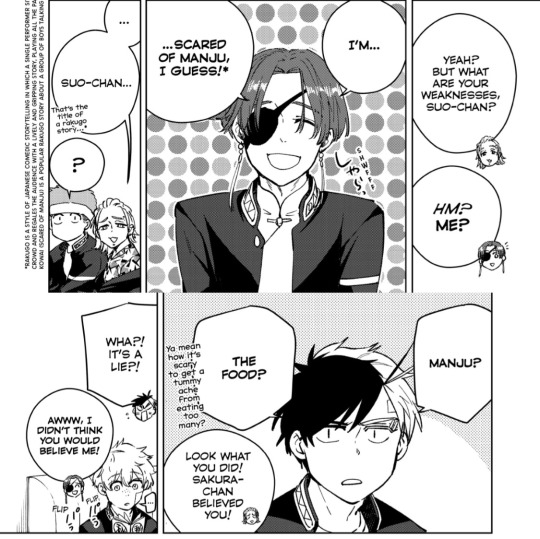
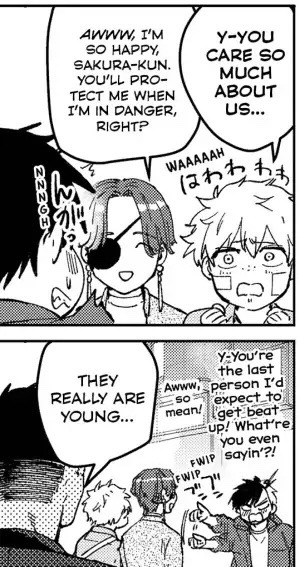
These aren’t even all the instances when Suo does this! I got lazy while compiling images (yes, theres *that* many moments where Suo teases Sakura), but I hope this paints a good perspective.
This makes Sakura thinks of him as “untrustworthy”, in a more lighthearted sense.
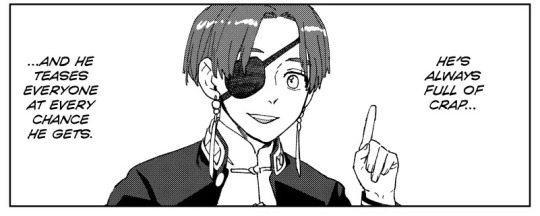
Infact, out of anyone else in the cast, Sakura is the only person who actively questions Suo’s character. (I’m not counting Tsugeura because their confrontation was a one time thing)
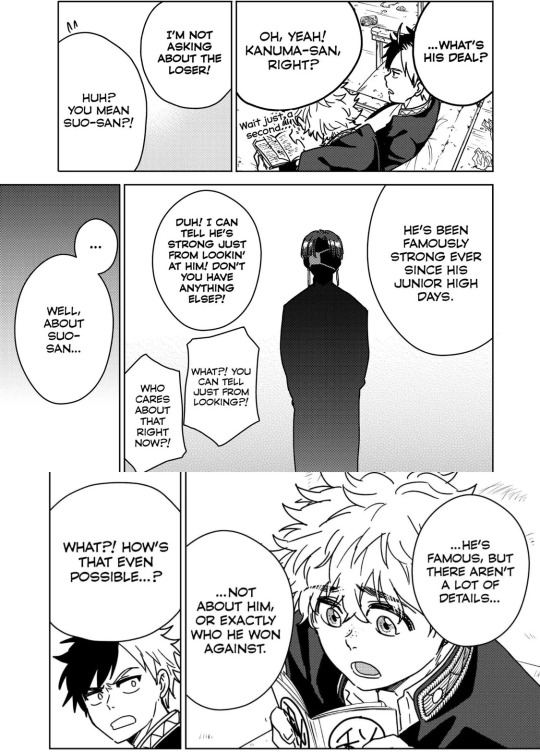
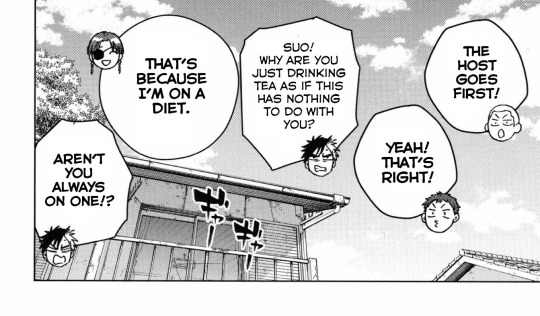
But here’s the thing: Even if Suo takes advantage of the fact that Sakura is gullible enough to believe anything just so he can mess with him, Sakura still relies on Suo.
He relies on him to come up with a strategic plan for their war, partners with Sugishita despite his initial reluctance, and even follows his advice on how to fight with others people (which works in his favor immensely during the beginning of Noroshi and while he works with Sugishita)
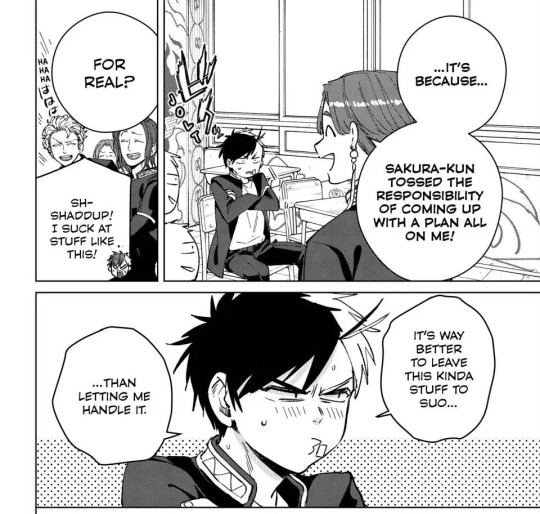
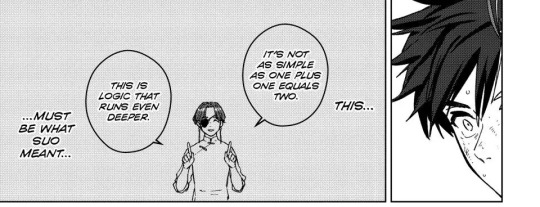
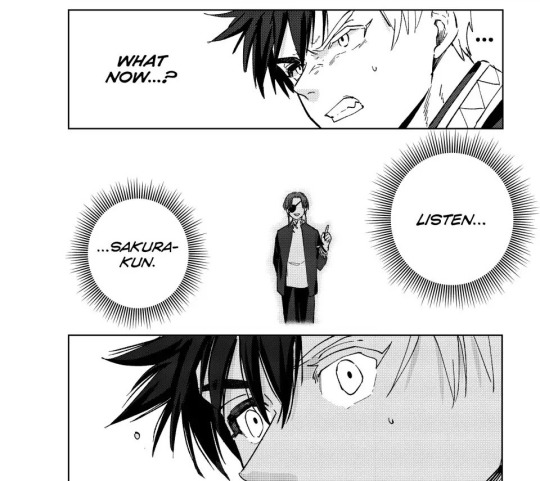
Theres also another moment I’d like to showcase (which is very underrated imo):
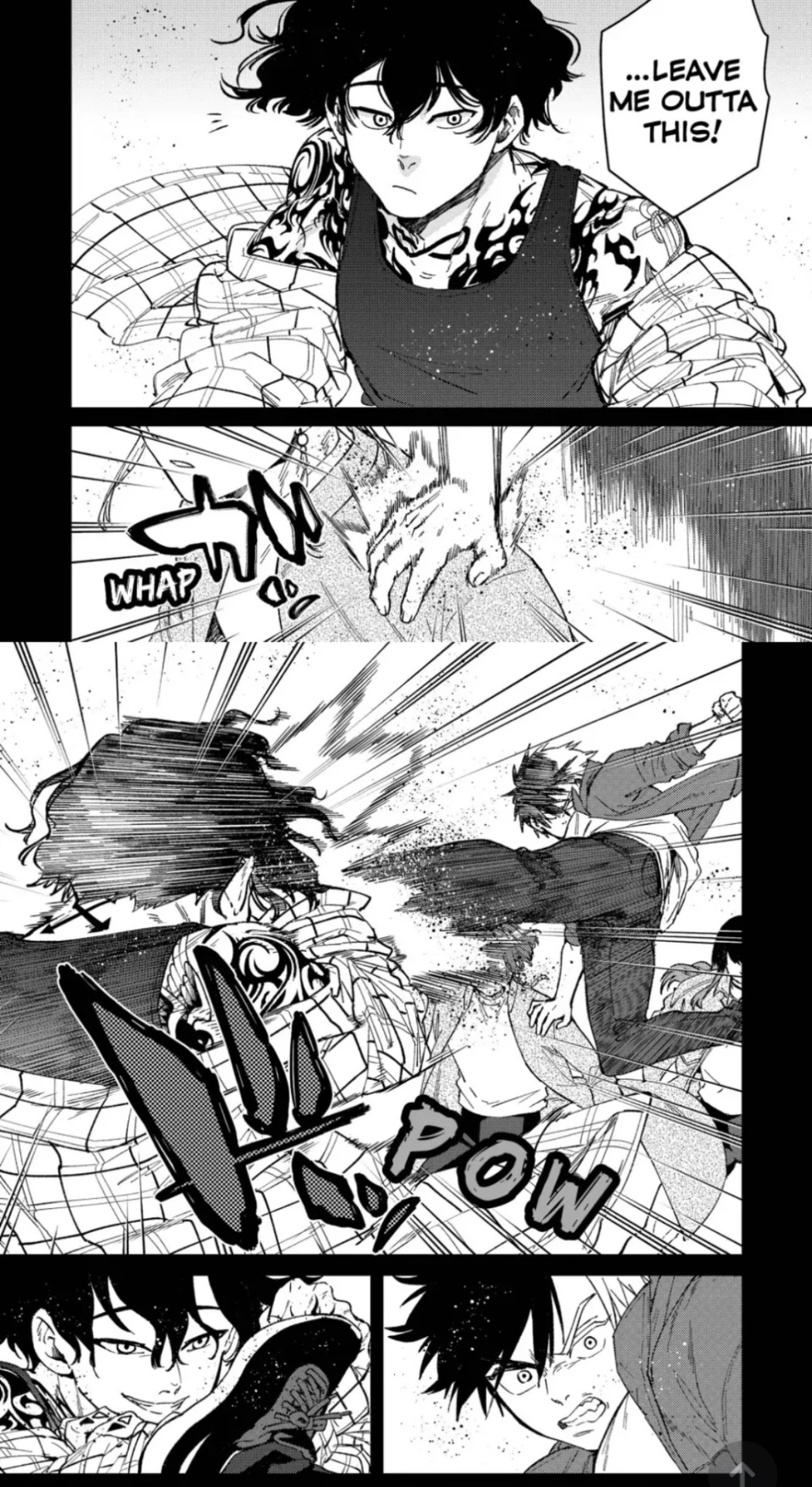
Here, we see Sakura taking the support of Suo’s shoulder in order to kick Endo in the face. We also see Suo defending Sakura a few moments ago as well.
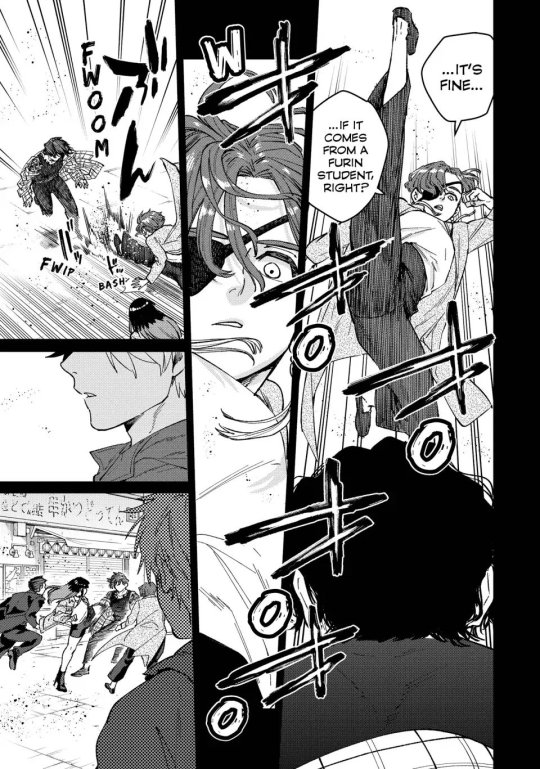
Heres’s the thing: Sakura is an arial fighter. He can easily jump to certain heights by himself, much less be able to kick his opponents mid-air. He doesn’t require any support to lift his body upwards.
So why would Sakura do this?

It’s simple: Sakura trusts Suo, whether it be direct or subconsciously. And as his vice captain, Suo also trusts Sakura. Why would he appoint him as class captain if otherwise?
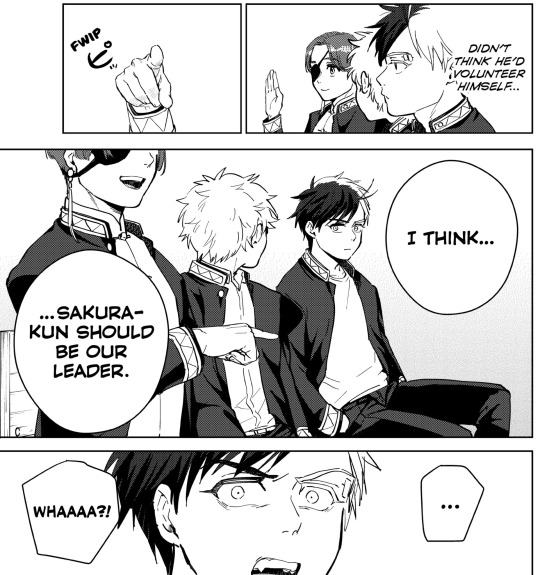
Their mutual trust plays a massive part in their relationship. There are many instances showing this aspect, but for now I will just analyze this iconic scene:
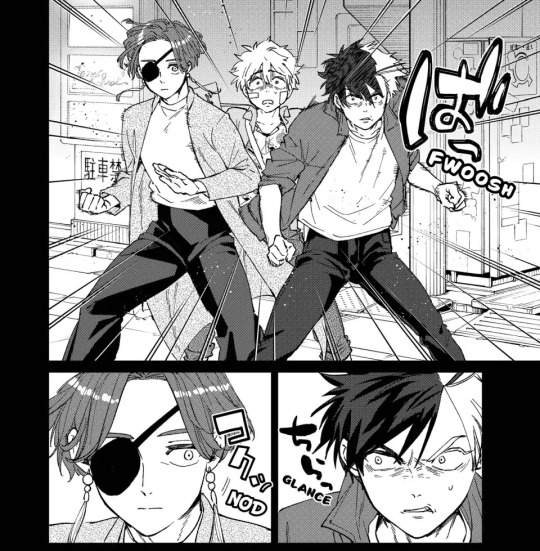
Both Sakura and Suo immediately jump into action in order to protect their friend, Nirei, from any immediate threat (Endo). They exchange no words, only a knowing glance to each other.
I believe that this page shows the essence of their relationship: Despite their petty banter and occasional disagreements, despite how less ‘open’ their relationship is, they are more often on the same wavelength than not.
They care for and trust each other immensely. However, many of their nuances are in hidden between the lines of their relationship due to the guarded nature of characters.
And it is with all these aspects combined that makes the Suo and Sakura duo appealing to many people.
TLDR: Suo and Sakura trust and care for each other a lot, despite their personal shortcomings and Suo incessantly messing with Sakura.
Thanks for coming to my TedTalk. There was so much more I wanted to write about here (such as their flawed perspectives on each other, suo’s perspective on sakura, and how they uplift each other), but unfortunately Tumblr literally refused to upload most of my images and nuked half of this post bc it decided not to save the draft; hence the short analysis. If you have any additional thoughts, feel free to let me know :)
#wind breaker#wbk#wbk spoilers#wind breaker manga#wbk analysis#wb#haruka sakura#hayato suo#sakura haruka#suo hayato
194 notes
·
View notes
Text
10 Character Dynamics the World Needs More of
Me handing out character dynamics like free samples at the Mall Food Court: “Take one! Or two! You’ll love it!”
I don’t care how many times these tropes have been done – write more of them. Write all of them. Fill out your author bingo card one by one.
1. “No one gets to kill you but me, Old Friend”
This. Right here. Primo rival content that I *live* for. All the juicy history between two old frenemies, the character drama, the backstory, the titillating unknown of what drove these two to rival status, bitter enemies that respect the heck out of each other, to the point that hell hath no fury should one get knocked down without the other’s consent.
And, of course, the moment where it seems all bets are off, when the rival comes to save their ass only to hand it back to them at a later date. The angst! The shipping fodder! Need I say more?
2. A bigger, badder villain, and their minion
You, reader, spend countless hours hating the guts of the big bad villain. They’re evil, they’re vile, they’re sadistic, heartless, irredeemable bastards. They killed your favorite character for shock value. The big bad moustache-twirling antagonist… is actually not the biggest fish in the story.
Either they’re coerced into doing evil as a puppet of the Bigger Bad, a tragic villain in their own right, or they have some reservation, some line even they won’t cross, someone else’s boots they have to kiss, someone who features in their nightmares, as they feature in the heroes. They end their stories dispatched without a thought by the Bigger Bad, or redeem themselves in death by taking out their masters. It never gets old.
3. A leader and their lancer: besties
You know what’s better than leaders and lancers who have zero faith in each other and are constantly bickering about who should be in charge? Leaders and their right-hands who adore each other (platonically). They have each other’s backs, they know each other’s greatest strengths and weaknesses and are each other’s perfect covers.
They can communicate with looks and vague gestures alone, they compliment each other’s flaws and misgivings, build up the rest of the team when they’re down on their luck, and should misfortune strike either, they pull out all the stops and show off exactly why they’re not to be trifled with, so that even the villain is afraid.
4. “I don’t even know who you are”
Oh, but you will. This one twists the knife, robbing the avenging hero of the importance in this world they’re desperate to maintain. They are their own hero, the sun revolves around them… but not to this one asshat that ruined their life and doesn’t even remember doing it.
An entire identity built upon the finding, fighting, and overcoming of this wrongdoer, every other goal in life cast aside for this one impossibility. Either the villain toys with the hero to make them irate, or gets suckerpunched by some pissant fueled by vengeance and spite and divine purpose to dole justice where justice is due.
6. The jaded badass and their naive ward
If the last 8 years of media is anything to go by, we still love this trope, whether it’s in a galaxy far, far away or a fungi-zombie post-apocalypse, or in the twilight hours of an era of legendary mutants. The best part of this trope? You get two often contradictory character types in one body. The pessimist, PTSD-ridden master of old with no living friends left and at least one dead love interest *and* beneath all that, still lies an atrophied heart of gold just waiting to be nurtured and revived.
The naive ward gets a hard lesson in how crappy the world can be, but also in how there’s still some goodness left, if their guardian cares about them. The jaded badass in turn, learns how good the world can be, that there’s something still worth fighting for beyond the next bottom of a bottle.
6. The enemy of my enemy (is my friend)
Similar to the “old friends”, this trope is often a result of the minioned Big Bad realizing they don’t want to be evil anymore. Or, bitter old rivals, sides of a war that have been fighting for generations, ideological polar opposites, fundamental polar opposites all come together when: Some evil schmuck managed to scare them both.
Doesn’t matter on what shaky ground this temporary alliance is built, or how long it lasts, equally-competent badasses on both sides finally work together and compliment each other’s strengths, and compensate for their weaknesses, in a way their teammates never could.
7. The irredeemable villain’s only wholesome connection
Not so irredeemable anymore, now are they? This trope messes with your head, taking a character you know has done heinous acts of terror, but who cares unflinchingly, unabashedly, about one thing – either their lover, their pet, their relative, or their kid.
This exists independently of the heroes and is not the same as an “oops I guess I’m your father” reveal. I’m talking this character who everyone is convinced cares about nothing and no one but themselves and their ambition still has a place in their soul for something they want to protect, they want to be loved by, or that they must spare from their atrocities.
8. Platonic Heterosexual Friendships
These two have seen each other at their most vulnerable. They’ve shared fears, dreams, desires, know each other’s deepest, darkest secrets. They’ve seen each other exhausted, frazzled, dressed up, dressed down, bloodied and broken and like a raw, open nerve. These two would die for each other, they would live for each other, and yet.
They’re not in love with each other. They’re wholly comfortable in each other’s spaces without lust and desire mucking up the atmosphere. Neither is the one, neither wants to be the one. They remain together not for the bonds of romance, but for the bonds of friendship, and nothing could be stronger.
10. The Ace and their best friend, the Self-Proclaimed Slut
These two respect the f*ck out of each other. One never mocks the other for lacking desire and in return, they’re never mocked for their promiscuity. They’ll never walk in each other’s shoes, but they don’t need to, to understand that’s just how some people are. They’re each other’s safest spaces when the world doesn’t take either of them seriously.
They’re each other’s biggest defenders against the bullies, presumers, the holier-than-thous who think they have it all figured out. They’re the perfect compliment to give advice on everything from relationships to the best outfits for an outing because there’s *zero sexual tension* between them. Or, maybe, if the stars align, they’re something more.
10. The redeeming villain, and their staunchest skeptic
This villain has lost everything – their home, the respect of their people, their worth, their evil ambition, their identity, and has begun working their way up from rock bottom doing everything in their power to show the heroes that they’re serious. They make amends, they break their bones proving themselves, they’ve swayed everyone they’ve wronged in the hero camp.
Except one. The one character that was probably their first defender, and got burned for it. The character that was naive enough to think this villain could be saved, and was wrong. The character that won’t be duped again without some serious drama and soul-bearing between them.
Now tell me which ones I missed!
506 notes
·
View notes
Note
Do you think there will come a time when everyone realizes what a piece of shit Rhys and the IC are like how we now see Andrea’s friends and boyfriend in The Devil Wears Prada as the real villains?
Since you brought up Devil Wears Prada, a book that got a movie adaptation, let me bring up a point about other book-to-movie adaptations.
I made a post a few weeks ago explaining that the reason I know 50 Shades of Grey is an incorrect representation of the BDSM community is because many people spoke up about it, and others took their critiques seriously. I think it’s the same case with the entire Twilight saga. Now, it feels more like a guilty pleasure for people, whereas back then, some thought Twilight could be the new Pride and Prejudice or something.
That’s why I don’t think the ACOTAR live-action adaptation will work (I’ve been planning to make a post about this it’s in my drafts, but I haven’t had the time to finish it yet😅). I think ACOTAR won’t survive the scrutiny of a larger audience, and dare I say, the chances of it flopping are high. ACOTAR will not be the next Game of Thrones, Hunger Games, or Harry Potter. Instead, ACOTAR will be the next Mortal Instruments or Eragon.
If those two flopped because they didn’t follow the source material, ACOTAR will flop because one, the fandom won’t be pleased with the casting, two, the plot is already being mocked by so many people as "fae porn" as of now. And three, many viewers who aren’t tied to the “it helped me get back into reading” sentiment will watch it and see its flaws for what they are.
There’s no chance in hell (unless they ensure from the very beginning that Tamlin is portrayed as the bad guy—which would in turn, make Feyre even less sympathetic early on) that they can convince viewers that Rhysand and the IC aren’t bad people. If they include an intro similar to GoT with a map, the Prythian map alone would cause an uproar. And do you think Rhysand hiding Feyre’s pregnancy issues from her wouldn’t have actual feminists everywhere cancelling the show and writing scathing articles in every major publication?
Why am I rambling about this live adaptation thing? Because I feel somewhat hopeless about this fandom’s ability to accept that Rhysand is a bad person. We’re in a giant bubble. However, if something as big as a series or movie adaptation happens, the audience will expand, and this bubble will burst. At that point, these “cult-like” fans will have to confront widespread criticism of Rhysand, Feyre, and the IC.
It’s one thing to argue with “antis” but imagine trying to defend these characters against millions of people who aren’t attached to blurry headcanons-fanfic-influenced perceptions or self-conjured justifications. Watching even more people mock Rhysand, Feyre and the IC on very public platforms—not just among the readers—will be a whole different experience for their mafiastancult because they cant keep saying "but if you read the book!" to defend it. Good luck with that.
I have a headache I hope my answer make sense 😅.
#thank you for giving me this 'ask'!#sorry for answering it so late!#anti rhys#anti acotar#anti acotar fandom#acotar critical#anti sjm#anti rhysand#acotar fandom critical#anti feysand#anti ic#feyre critical
69 notes
·
View notes
Note
just saw ur gale/mystra analysis post. im new to the game and dnd lore and honestly… ur take on their relationship feels like the most natural/compelling one??? esp since its all too easy to simplify topics that have many facets and nuance….
thanks for sharing i love analysis and reading people’s takes on narratives : D
My pleasure! (Bee from the future here: congrats, you spawned another meta!)
I love complicated characters, WAY more than I like a clear cut-and-dry case. Flaws, to me, are what make a character compelling and lead to interesting stories about them with choices that can get them into situations. I'm both writing a fanfic and running a campaign where I'm playing as Gale, and in the interest of portraying him properly and in-character, I've gone into SUCH a deep dive into all the decisions and facts that make him him.
It helps to, y'know, also be in love with the fictional wizard, but I digress
The thing about Baldur's Gate 3 is that no character in there is perfect. I've seen a couple analyses about the theme of continuing cycles of abuse vs breaking out of them, but in my mind, in terms of the characters themselves, it goes like this:
The origin characters have just come out of the lowest situation of their lives (Lae'zel being the exception; being tadpoled is a gith's worst nightmare. You're seeing that lowest situation in real time).
Not the lowest point, mind. Gale's lowest was probably the day after he got the Orb. Wyll's was probably the day his father cast him out. Karlach's was the day she lost her heart. But the lowest, accepted normal for them is what they've just left.
They're then thrown out of their depth and forced to rely on you to live. That's #1 priority: living. We get the extremes of these characters before we get their nuances, because they're quite literally at their breaking points.
Then once we get to know them, we see their wants, their hopes, their fears, as they open up to us. Every companion's story is at their own pace, but they all have a moment where they ping-pong between despondency and desire. Sometimes that desire is what we know isn't good for them, like Shadowheart wanting to be a Dark Justiciar. Sometimes that despondency is only for a flicker, like Astarion's realization that he's condemned 7000 people to a half-life of tortured spawnhood for as long as he's been a vampire.
Romance lets us crack all that open more, because if you pursue a romantic partner, they see you as their closest confidant. They WANT to trust you, so they're more willing to explain how they see the world and what decisions they want to chase.
And then their endings. Those often get simplified as good/bad, continuing the cycle vs breaking away from it. But how is Duke Wyll on the same platform as Ascended Astarion? He's not evil, he's not even entirely unhappy. He might even have broken out of his abusive cycle with Mizora, if you played your cards right. And Ascended Astarion is overjoyed, even if he is remarkably more cold.
I think that the endings are less a dichotomy of "this is good for them" vs "this is bad for them," and more one of "bringing out their best traits" vs "bringing out their worst."
Wyll's worst trait is being willing to sacrifice his own wants for whatever people desire of him. His best is standing for what he believes in and ensuring people are safe. Duke Wyll leans into that necessity to turn the other cheek in the name of people who count on him, while the Blade of Avernus has seized that moral compass of his and forged it out of mithral.
Shadowheart's worst trait is blind obedience at the cost of her individuality, while her best is her desire to be kind to things that don't deserve to be hurt. Mother Superior Shadowheart's whole life is defined by Shar. Selûnite Shadowheart's life is defined by her hospitality, especially towards animals.
Karlach's worst trait is how willing she is to accept that things are (to quote her) fucked, letting despair override hope. Her best is her durability in the face of horror. Exploded Karlach would rather die than try to work out a solution in the Hells, because she's terrified of facing Zariel alone. Mindflayer Karlach has accepted her fate and decides to give up her heart and soul to go out a hero, losing who she is. Fury of Avernus Karlach is willing to keep fighting for a solution, and by the time the epilogue happens, she's got her sights set on one.
Astarion's worst trait is his desire for power over people. His best trait is using the tools he has to his advantage. Ascended Astarion has let his powerhungry nature and paranoia lead all of his decisions, with his sights set on dominating mankind. Spawn Astarion has embraced what he is, and carved out a life for himself where he can do as he pleases.
Lae'zel's worst trait is her blind fanaticism, while her best trait is her individual dedication, making her loyalty a marriage of the two. Ascended Lae'zel is a meal for the lich queen, turning a blind eye to all Vlaakith's tried to do to her and literally being consumed by her fervor. Champion of Orpheus Lae'zel has turned her loyalty into something productive for diplomacy. Faerûnian Lae'zel has seized her individuality by the throat and decided her own future.
And then Gale. Gale's worst traits are his hubris and, paradoxically, his low self worth. His best traits are his creativity and wonder for the world. God Gale is the embodiment of ambition, having burned away all but that in pursuit of perfection. Exploded Gale has let his remorse blot out all hope for a redemption in which he does not die, because he thinks he's earned it. Professor Gale leads his life by embracing the school of Illusion and letting his creativity thrive, teaching others to do the same. House Husband Gale has multiple creative projects he's working on, and Adventurer Gale is always finding new sights to see and wanting to share them with you.
There are arguments to be made on which ending the origins are happiest in, certainly, or which one benefits them the most, but each ending represents the extreme of a facet they possess.
So with all that, there's a sort of malleable method to figuring out the ins and outs of a character.
You take their endings—all of them, all variables they can have—and reverse-engineer the flaws and details they carry. Then you start to notice how those work into their approvals for minor things: Astarion approving of your taking of the Blood of Lathander, or Shadowheart approving of standing up for Arabella. Getting a list of approvals and disapprovals is helpful, but having those endings on hand tells you why they react like that to a majority of their decisions.
You take their romance-route explanations of how they act, and apply those to earlier decisions. Astarion's confession to manipulating you and Araj-prompted admittance to using himself as a tool brings to light how he reacts to your decisions, regardless of his actual opinions on them. Wyll's fairytale romance and love of poetic adages speaks to his idealistic nature, and why he takes a sometimes-blinded approach to decisions in which the "right" answer isn't always the smart one.
You take their beginning reactions to stress and use that to measure how future decisions impact them. Lae'zel locks down and gets snappy when she's scared, while Gale immediately turns to diplomacy. Shadowheart has gallows humor, while Wyll turns to quiet acceptance. If they break from these and seem even worse, you know the situation is more dire in their minds than having seven days to live.
And then you factor in all their fun facts and dialogue choices and backstories.
A wizard falls in love with a goddess and her magic, attempts to retrieve a piece of her power for her, is scorned for his attempt and is cursed to die.
Give that backstory to a Tav. Look at how it changes.
A chaotic good wizard fell in love with a goddess, thought retrieving a piece of power for her would be a showy bouquet of love, and was punished for not thinking things through.
A lawful evil wizard fell in love with a goddess's power, snatched the most precious thing she owned, tried to use it to barter his way through to the secrets she kept, and was given a swift retribution.
Same backstory. Same class, same act, same goddess. Wildly different connotations. Wildly different conclusions as to who is in the wrong.
If you take all there is to Gale, all that the game shows us makes up his character, and apply it to this backstory, you get what really happened:
A wizard, enamored with magic, fell in love with a goddess. His desires led him to want more than she was willing to give. In his well-buried fear of inadequacy, he concluded that the reason she wouldn't indulge his ambitions was because he just hadn't proven himself worthy enough. So he tried to prove himself, but he lacked the context for what he was proving himself with. And the goddess, seeing a weapon that had killed her predecessor, saw this ambitious wizard as losing his way and coming for her just like the weapon's creator had. She was angry, she withdrew his link to her, and he didn't know why. So he drew the conclusion that she took his powers to punish him, and let that encompass his fall from grace.
Was he wrong to reach for what was out there?
If you knew that the answers to everything you cared about were not only known, but kept by someone you loved—someone who adored you—what would you do to ask to see them? What if your curiosities were if there were other planets with life out there, or how dark matter worked, or whether or not we could one day travel in the stars? What if it was the potential cure to an illness that's little-understood, or the way to make a program you dreamt up, or the scope of the true limits of your artistic talents? Would your answer change?
Was she wrong to cut him off?
If you were once hurt, and the person you loved—the person who adored you—brought the thing that caused it to your door, believing you'd want it, how would you react to seeing it? What if that thing was someone you thought you'd broken contact with, like a friend or family member you'd been trying to avoid? Would your answer change?
That's the sort of scope that needs to be applied to this, on both sides. You have to take the perspectives of each party, and apply two analogies instead of one.
Gale saw the vastness of the universe, untold wonders, the solution to every question he could ever dream up, and saw Mystra as withholding this from him because she thought he just wasn't worthy enough. To claim Mystra knew his perspective does her a disservice.
Mystra saw a cruel weapon she thought long gone, in the hands of someone who could use it, brought right to her, and thought Gale was willingly following the path of Karsus. To claim Gale knew her perspective does him a disservice.
Should Gale have researched his prize more, so he knew just what he was obtaining? Should he have kept his hands off a cursed book that would devour him? Of course he should have.
Should he have given up on chasing his dreams?
Should Mystra have understood that Gale's pursuit of power was nothing like Karsus'? Should she have communicated when she was angry instead of giving the cold shoulder? Of course she should have.
Should she have given him the benefit of the doubt?
That's the root of their falling out. That's what leads to hurt being inflicted. Understandable, human reactions to the situations they perceive. Unhealthy, unwise choices made afterwards.
You work backwards from this to figure out their dynamic as Chosen and goddess. You work forward from this to understand more of where Gale and Mystra are during the events of Baldur's Gate 3. Gale reached too high, and understands this. His goddess hates him, and he regrets this. Mystra isolated Gale, and understands this. Her Chosen wants redemption, and she wants to make it happen.
Just like we took Gale's character into account, we also have to take Mystra's.
A goddess is faced with a problem. She uses someone who's desperate for approval to solve it, by telling him to kill himself.
An evil goddess is faced with a threat to her reign. She sees someone who's unfailingly loyal and hates himself, and elects to have him tear himself apart rather than do anything about it.
A good goddess is terrified of the future. She sees someone who tried to hurt her, who's going to die anyways, and tells him to use it to save the world.
Same story. Same act, same power, same pawn. Different character. Different perspective. Different outlook on whether or not this is the right thing to do.
Mystra has died, multiple times, to people trying to stake claim to her domain. Someone appears with the very thing that could do it again, right as she's regained her stability.
She does not see mortals the way mortals do. She is timeless. She is eternal. She has a duty to protect billions of people, and one person lost to protect that number is more than worth the sacrifice.
People like to bring up the Seven Sisters as proof of Mystra's cruelty. For those unaware, Mystra asked permission to, then possessed, a woman, used her to court a man (with dubious consent from the woman), and bore seven children, all of whom were capable of bearing Mystra's power as Chosen without dying. The woman she possessed was killed in the process (reduced to no more than a husk, then slain by her now-husband, hoping to end her suffering), and the husband was horrified by the whole story.
Mystra needed Chosen in order to restore herself in the event that she was killed again, to prevent magic as a whole from collapsing and wreaking havoc on the mortal realm, like it had in the few seconds Mystryl had been dead. Elminster, Khelben Blackstaff, and the Seven Sisters contributed to this. The more Chosen she has, the better; what happens if Elminster dies? She can't afford to have all her eggs in one basket.
Mystra has Volo (yeah, that Volo) as a Weave Anchor, imparted with a portion of her power to prevent the Weave from shredding itself to pieces in her absence. All Chosen of Mystra are Weave Anchors by nature. The creation of Weave Anchors was mandated by Ao, the Overgod, and Chosen are the best way to make sure those anchors aren't drained by ambitious people hoping for godlike power. Chosen can, and will, defend themselves, unlike static locations (which Mystra also has). The anchors are why the Weave wasn't completely obliterated during Mystra's last death, when the Spellplague rose up, because they stabilized the Weave around them.
Everything Mystra does is in the name of the big picture, to prevent a catastrophe like the fall of Netheril from happening again. Her restriction of magic, her numerous Chosen, her creation of Weave Anchors, her destruction of those who would claim her power, it's all in the name of the stability she's been charged with. Dornal Silverhand's grief and Elué Silverhand's death, while regrettable, were worth it to bring seven more anchors into existence to save all of the Material.
So someone appears with the Crown of Karsus, potentially powerful enough to try to kill the other gods in the name of the Dead Three. She can't risk being a target of them. She can't risk the destruction of magic again.
Gale is going to die. He lives in fear. He begs for forgiveness.
In Mystra's eyes, she's offering him the best outcome. She'll let him die in service to her, to save Faerûn, and she'll forgive him. He's going to die anyways, and if he does this, she'll give him everything (she thinks) he could ever want in her realm. She's asking him to do what (she thinks) is the right thing.
"She would consider what she considers to be forgiveness."
Notably, she leaves the decision in his hands. She doesn't have Elminster lead him to the Nether Brain. She doesn't activate him as soon as he's there. When he lives yet, she doesn't revoke the charm that keeps him stable. And when he declines, when he lets it go and starts pursuing Karsus' path, she doesn't smite him on the spot.
She is (she thinks) being incredibly patient. If Gale is going to try to be Karsus II, she's ready for him. If he decides to walk off and keep the Orb, he's dug his own grave in the Fugue Plane (those who don't have a god to claim them roam endlessly as husks and form a wall of bodies around the City of Judgement).
From her perspective, she's not being unreasonable. But from the perspective of a mortal, she absolutely is.
"Now, I have a question for thee: what is the worth of a single mortal's life?"
This is a question she cannot answer properly.
I think a lot of characterization is lost whenever someone paints one of them as being totally in the right. But I also think you have to be invested in them as characters to want to see that characterization. If you want to write about Mystra, you have to try to get into her head, analyze the decisions she made, figure out why she thinks she was right, and follow the pattern.
Gale's sacrifice is a very predictable thing for her to ask for.
#bg3#gale dekarios#gale of waterdeep#mystra#long post#like really long post holy hells#did not expect this to go on for this long#swearing tw#< for karlach#oh yeah#astarion#karlach#wyll ravengard#shadowheart#lae'zel#ask bee
314 notes
·
View notes
Text
" HOTD's Issues Writing Women Part 2: The Whitewashing of Rhaenyra
**This is part 2 of my analysis on the issues with the writing of the two main female characters. If you haven’t already please read my part 1 post where I analyze Alicent’s character assassination which you can find on my profile.** I think many fans on the Blacks and Greens and in between regarding HOTD have been concerned and disappointed with the way the two main female characters: Rhaenyra Targaryen and Alicent Hightower have been written in HOTD seasons 1-2. This is very understandable. Female characters in general in HOTD and I think a lot of Hollywood films nowadays are not being written as well as they used to be and could be. Go on Youtube or Google and you'll find many film reviews/tv show reviews that critique the Mary Sue and Girlbossification or just poorly written in general female characters that are taking up a chunk of characters in Hollywood. Rhaenyra and Alicent to me were such great characters in F&B. They were two different kinds of medieval women in a fantasy setting. One, the medieval queen who gains power/influence through her relationship with men and advocating for her son. Two, the medieval queen who sought power in her name and defied some norms that make her compelling but also immoral in their eyes. They are two deeply flawed and complex characters fighting on opposite sides of a dynastic civil war.
This post is here to address the main issues of whitewashing when it comes to writing Rhaenyra Targaryen.
\***Some disclaimers: This is no issue with the actor themself. Emma D'Arcy while I may disagree with their opinions from time to time, they are a wonderful actor who is doing the best they can with the scripts they're given, so this is by no means a critique of them. I am going off of the show canon although the book will be mentioned.**
**So firstly... What is whitewashing?**
The modern definition of white washing is to cast in a show/movie or rewrite a character of a minority and make them white. For example, if someone decides to do a movie about Rosa Parks and they cast Emma Stone. However, white washing has another definition. It means to essentially remove or hide negative unpleasant facts or traits of a person or thing. I think Rhaenyra Targaryen suffers from this problem as many of her written negative traits or deeds so far are either not shown, projected onto another character close to her (Daemon Targaryen mostly), or severely downplayed. This results in a character that is almost too virtuous and bland for the setting she is in and a far cry from who she should be. A character whom doesn't seem to fit in the ruthless at times immoral world of Westeros. A character whom is almost a close to a Mary Sue. As I am very much on the belief that flaws versus virtues are what make a character compelling and human.
**I will say not every change made to Rhaenyra story arc and personality are necessarily all bad. Some are good ideas just poorly executed (ex - exploring more of Rhaenyra's hinted bisexuality, as there are hints in F&B that her close relationship with Laena may or may not have been more than platonic) and others are just good changes in general.**
*1. Victims vs. Villains - Biases in Writing Female Characters*
In the words of the iconic Grey's Anatomy actress Ellen Pompeo, “Women are one of two roles. You’re either the victim or the villain. But the victims are only victims because they don’t have what it takes to be the villain.” I think she states the major issue with writing female characters nowadays that HOTD has an issue with. Women must either be victims or villains. The character assassination of Alicent and white washing of Rhaenyra to me stems from this: Alicent is the villain in Rhaenyra's story to Rhaenyra's victimhood.
*2. Rhaenyra's Negative Traits: Arrogance, Hot Temper, Frivolity, and Bad Decisions to Peace-Loving and Plainness*
Rhaenyra had many great qualities in the book but it is only when coupled with major character flaws are we truly compelled. She was a loving mother, passionate, intelligent to a degree, etc. However, she was also very ambitious and power-hungry, arrogant at times, quick to anger, slow to forgive, and frivolous at times. **As a writer myself, I firmly believe that characters are truly humanized and compelling when they have major character flaws coupled with their virtues. Flaws they either have to overcome or use to their advantage. Flaws that make them who they are. Flaws create layers of complexity in a character. Or Flaws that help foster the characters downfall.**
I'm not saying the Rhaenyra in the show isn't flawed. She is! For example, I think what's great is that a flaw they gave Rhaenyra is something show Viserys also had: the ability to ignore or downplay potential conflicts or hard truths versus facing them head on. Viserys refused to see the potential conflicts in naming Rhaenyra heir or pretending her elder three children are trueborn. Rhaenyra in the show refused to listen to Jace whose concerns regarding his parentage as her successor and the dragonseeds were ignored or dismissed. The issue is thought, Rhaenyra is not given the flaws that she most certainly had, **flaws that helped lead to her downfall**. She's not flawed the way she's supposed to be.
Similar to many other Targaryens including her half-brother Aegon II, Rhaenyra was quick to anger and slow to forgive. We have some brief moments where we see Rhaenyra's temper and quick witt, but we don't see the major moments where her major character flaws are shown. Alicent provokes Rhaenyra for example in season 1, having her take Joffrey to her moments after he is born. We never see Rhaenyra provoke Alicent back. Any times where we should have seen Rhaenyra's sharp temper at the slightest of remarks are not shown.
Rhaenyra's actions herself were also very whitewashed with how they were portrayed. We either see their negative consequences downplayed, not shown, or the actions were projected onto another male character. In the books due to how similar Laenor and Rhaenyra were in looks (I mean they were both white) there was still a tad more ambiguity as to whether or not Jace, Luke, and Joffrey were bastards. Race changing the Velaryons made it even more obvious her elder three boys were bastards. I took issue with the writing of Rhaenyra's dialogue and that of the characters around her, not truly showcasing why having bastards, especially as a woman, is a truly egregious thing. The potential chaos Rhaenyra could cause was completely downplayed.
A few actions for example that were incredibly violent and evil were butchered. First example being the murder of Vaemond Velaryon. I was disappointed with this scene. Firstly, we only see Vaemond protest Luke inheriting Driftmark which sets it up as more so an ambitious second son seeking power versus a man who doesn't want his house to be run by someone not of his blood. We don't see other Velaryons protesting with him. After Vaemond made his little speech, Rhaenyra orders him dead and Daemon kills him on **her orders**. She then viciously has his corpse fed to her dragon Syrax. I think this scene was crucial as it foreshadows the danger Rhaenyra would be in the future to House Velaryon and sow more seeds of discontent that are crucial to the house's eventual turn to the Green side. Not only is Vaemond killed more viciously, Viserys orders the tongue removal of even more Velaryons who sided with Vaemond with Rhaenyra's consent! Instead, the show projects this entirely onto Daemon. Daemon goes Rogue (see what I did there) and kills Vaemond on his own accord. Rhaenyra stands there shocked and doesn't even order the body fed to her dragon. Rhaenyra is absolved from all blame to Vaemond's unjust execution without trial.
The thing about B&C is Rhaenyra was paralyzed with grief for her son, Luke. The moment her child died was the moment where her descent into madness and powerful wrath began to truly manifest and she would stop at nothing. I was very disappointed in the fact that she has one episode of grieving and then continues to be so level-headed. I couldn't feel her grief, rage, and resentment towards the Greens for her son's death that makes the war even worse. Daemon tells Rhaenyra that he would avenge her son. I loved the acting of Matt and Emma during their argument about the aftermath. However, I felt like Rhaenyra wasn't acting on character with the book. I don't think book Rhaenyra was 100% okay with a child dying as her vengeance, but I do feel with how angered and filled with grief and hatred Rhaenyra should be, Rhaenyra should be a bit more hardened. She should have not been so sorry about the child's death.
I also think that one of Rhaenyra's most controversial and evil decisions in the future are going to either not be included, blamed on someone else, or downplayed. It's very clear at the end of season 2 episode 8 that my favorite dragonseed Nettles is being cut and given to Rhaena who had her own plot and dragon hatchling. After Ulf the White and Hugh Hammer betray her, Rhaenyra's paranoia goes overload and declares that all the dragonseeds are traitors. Corlys advocates for Addam Velaryon and Nettles and Rhaenyra responds by having him arrested. He warns Addam, and is then bound, beaten, and thrown into the black cells. One of her most powerful allies is now thrown in the black cells. This causes the fleet of House Velaryon to turn against her. Later, she attempts to violate guest right, which is sacred in Westeros (which is why the Red Wedding was so horrific to Westeros even more so), by plotting to have Nettles murdered. As Nettles is being cut, I doubt they'd show this truly negative action as Rhaena can't have Nettles's complete plot. Rhaenyra's unjust arrest of Corlys and House Velaryon turning from her from what they're doing so far might just be blamed on someone else, have a different excuse that is not the one that the book gave, or not shown whatsoever.
I also think they might just be setting her up to be innocent of the torture of Tyland Lannister. After the Greens flee with most of the treasury leaving Rhaenyra in Kingslanding pretty broke, he refused to tell her where the gold was sent. Under Rhaenyra's orders he was tortured and castrated and blinded and disfigured to point of being disgusting. They might just have him be tortured by Mysaria or Daemon on their own accord without Rhaenyra's orders, leaving her innocent, or they will have him tortured by the Triarchy or something. Maybe after Mysaria and/or Daemon torture him, they'll frame it as vengeance for Jace and then Rhaenyra might let him go to appear merciful to an audience. As they cut Maelor whose murder was the breaking point that caused Helaena's suicide, we might not see how another child under the war was murdered by her faction. I worry that they won't show how how her cruelties that she did on her own accord caused her to be hated just as much if not more than her half brothers Aegon II and Aemond. They might not truly set the tone and show actions that lead to her being "Rhaenyra the Cruel" and "Maegor with Teats" they might not show the actions, or blame them on someone else or something else. They might not have her tax into oblivion the smallfolk or send her knight inquisitors to execute dozens upon dozens of supposed or proven Green traitors. I was also confused by the characterization of the smallfolk as these naive little lambs who will follow whatever. There is no famine or riot against the Greens at the point the show showed it. I was pleased with the fact that we saw the book-accurate support the smallfolk gave to Helaena after her son was murdered and how angered they were at Rhaenyra and the Blacks. However, days later they are singing her praises. It makes no sense to me that they would forget something so easily. Of course, I argue in another post on my profile why the riot and famine made no sense. So they might continue to get rid of her all of her negative actions.
**These evil actions make her even more compelling and even more realistic in a violent medieval world. It shows how both sides commit great evils as both Rhaenyra and Aegon II were not remembered fondly by their own descendants, smallfolk, and nobles alike.**
I also hate how they hardly showed just how feminine almost girly Rhaenyra was. Rhaenyra notably loved fashion and wearing beautiful intricate gowns that always showed off her beauty and figure. She dressed very richly as befitting her station, wearing gowns of purple with maroon velvet and Myrish lace. Her bodices often had pearls and diamonds. She always wore rings on her finger that she'd play with and turn when anxious. I honestly found these traits very endearing and relatable as someone who is a girly girl. Finally, a "strong female character" who is a leader who is also very feminine and girly. She doesn't need to be a tomboy and wield a sword to be a badass. But no... we don't see that. Yes the costumes Emma D'Arcy wore were nice I guess on the show but they didn't feel like something book Rhaenyra would wear. I get they had budgets but still... you couldn't have made something else? Like where is the purple and maroon? She's mostly wearing just red and black. No rings. No nothing!
*3. Unequal Screen Time and Too "Modernized": Rhaenyra is the Main Modern Girl*
I feel like HOTD has a problem with perspective. GOT had it perfectly done! The original ASOIAF were written from the perspective of multiple characters so we got a perfect ensemble cast with writing that highlighted the stories and perspectives of many different characters. Jon Snow's narrative didn't overtake Daenerys's screen time and vice versa which is just how it should be. However, I feel HOTD makes a mistake especially in season 1 with framing. Rhaenyra as the main with secondary-main perspectives of Alicent and Daemon. We get most of season 1 from Rhaenyra's perspective and to a lesser extent Daemon and Alicent when the show should have been formatted like GOT as multiple perspectives were given in F&B. We should have gotten an ensemble cast with equal development and perspective from multiple characters, especially an equal development of both Aegon II and Rhaenyra. We get both of Rhaenyra's weddings, two births, her raising her children, many scenes with her dragon, her perspective, and her interactions. Our first intro to her sets her up in a more heroic light as she's a beautiful princess riding her dragon. We don't get Aegon II's wedding or Alicent's. No birth scenes for Alicent or Helaena. We hardly get their perspectives compared to Rhaenyra. We should have seen more of Aegon II's childhood and perspective versus just him being a bully and later a rapist. While they improved perspective a bit more in season 2, it's not enough to take away from what was done in season 1. Rhaenyra is the protagonist and **THE main character versus A main character.**
What I think they should have done is showcase the real dynamic of Alicent and Rhaenyra more. They can start off with their friendship but then transition it to the dynamic that both women had at court: competition. Both women wanted to be First Lady of the Realm and first priority to King Viserys. The Queen vs the Princess and named heir.
Rhaenyra does at times come off as more modern than she should be. I think her and even her aunt Rhaenys. For example, in the book Rhaenyra is at times very homophobic by our standards to Laenor. When she discovers she's to marry Laenor Velaryon in the show, we see her initially not too excited about it, but not fully antagonistic. She in fact has a very decent and friendship like conversation where she uses the metaphor of preferring roast duck to insinuate she understands and accepts Laenor for being gay, deciding to do their duty and support one another, while pursuing their own pleasure with each other's consent with whomever that may be. They appear to be very supportive of one another times, at least on Rhaenyra's end. She compliments him deeply when he says he wishes he were different.
While I'm sure on some level Rhaenyra wishes Laenor was bisexual at the very least so they can have more than a friendship and have trueborn kids together, Rhaenyra is almost too accepting for her medieval context. In the medieval world, same sex relationships were a HUGE no-no. In fact being gay was considered a mental illness and sickness up until the 20th century! Rhaenyra appears too accepting of Laenor, appearing too modern in just how accepting she is. In reality, while I'm sure Book Rhaenyra cared for Laenor on some level and had some kind of respect for him and affection, it wasn't this deep and this accepting. Laenor did mean something to her on some level, after all he is still the man she married, and very important to her storyline---however Rhaenyra in the book as a much more medieval reaction and medieval view on his sexuality. She was notably very unhappy about her betrothal to him. It took serious threats from King Viserys to remove her from the line of succession in order to get her on board and she did so reluctantly. She notably even said that "My half brothers would be more to his taste." This is a very cutting and almost homophobic statement. I mean her half-brothers were still toddlers. However, we never get any true antagonism, frustration, or even subtle or outward homophobia on Rhaenyra's end. While this statement is mean and homophobic, that is a more medieval response. It's sad, but it's true. Rhaenyra is a medieval woman in a medieval setting. She is a product of what her society raised her to be, which is being gay isn't something one should accept.
The same issue occurs with Rhaenys having an almost too modern point of view or opinion that doesn't fit with her medieval setting. When she discovers her husband Corlys Velaryon has bastard children, Addam and Alyn of Hull, she is neither furious nor disappointed or horrified. In fact, Rhaenys advocates that they deserve to be "raised up and honored not hidden in the tides." This is an incredibly unrealistic and unfitting reaction on Rhaenys's end. In our modern day society, even, if a woman finds out her husband cheated on her and sired kids off his side chick, she'd be furious. Of course, I think a moral modern woman wouldn't take her anger out on the children, but still. Rhaenys's reaction is almost too modern and too gracious. Characters are products of their circumstances. Despite Westeros being a fantasy world, we feel how medieval the characters are through their beliefs and behaviors. Catelyn Stark or Cersei Lannister's reactions to their husband's bastards is far more realistic---specifically how Catelyn and Cersei hated what their husbands had done and felt it was an affront to them personally. Corlys in the books was terrified of Rhaenys finding out as it would dishonor him, her, and their dead children together which is why he tried to pass them off as Laenor's no matter how ridiculous is sounded. Rhaenys should have been more realistically horrified at Corlys and angry. She shouldn't be advocating for them to be anywhere near her house or imply they should have been raised amongst their own trueborn children.
I think this does two things: 1) Makes it though Rhaenys is fully on Rhaenyra's side when raising her bastard children of Harwin as if they are her trueborn grandsons and 2) Modernizes her too much. That is a main issue. The show attempts to modernize her and make her appeal to a more modern audience. However, there is a way to do that without modernizing her so much that she doesn't seem to fit with her medieval context.
was very disappointed when I heard that the directors told Olivia Cooke to portray Alicent as "woman for Trump" and Rhaenyra is this "punk-rock Hillary Clinton." Modern day politics and movements and ideologies have little to no place in the way Westeros should be written as its a **realistic medieval setting with realistic medieval characters in a fantasy world**. Rhaenyra is too modern in her interactions and beliefs that she doesn't seem to fit well in Westeros. Rhaenyra as well is also presented as this more feminist character.
*4. Two Things Can Be True At Once: Women Can Be Victims of Sexism AND Still Do Terrible Things, Be Self-Serving, and Wield Significant Amounts of Power*
**What I ultimately believe that Condal and the HOTD production seem to get wrong is that in a medieval setting like Westeros, women are ALWAYS overlooked and dismissed and cannot take so much significant power. I feel like they believe that women can't do terrible things in the patriarchal system of Westeros while being victims of sexism.**
Women in the real middle ages and Westeros in Martin's story are not feminists by our definition. At times we see women take advantage of and gain power from the sexist patriarchal society they live in. We see it with Cersei Lannister, Margaery Tyrell, Daenerys Targareyen, Catelyn Stark, Olenna Tyrell, Ellaria Sand, Lysa Arryn, Melisandre, Arya Stark, Sansa Stark, every woman in the original GOT series were victims of sexism and an oppressive patriarchal system of Westeros just like real women of the Middle Ages AND YET they still were able to wield some power and do terrible or morally gray things. We can view them as victims of a horrible system but still see how they take advantage of it, gain power and agency as they have no choice to use the system versus fight it, do horrible things, but still view them as victims.
Rhaenyra is one example! I will say that this is partly more so the interpretation of the modern casual audience versus a writing issue, but it is still a writing issue that there are people who believe her to be a feminist. She's not! Of course just because she isn't one doesn't mean you can't root for her, but don't root for her if you think she's a feminist. We might never see the moments where Rhaenyra herself is denying women rights of inheritance from Lady Stokeworth to Lady Rosby. We should have been emphasized that Rhaenyra is not the closest thing to a modern day feminist. She is not advocating for women's rights or to make the world better for women, but to be an exception to the rule. Like most medieval woman in power, she takes advantage of the patriarchal system and gets power from it. Laena Velaryon is older than Laenor. She takes advantage of patriachal rulings to install her (bastard) "son of Laenor" as future Lord of Driftmark versus advocating that the eldest child, Baela Targaryen, daughter of Laena Velaryon, the elder sibling, to inherit Driftmark.
Victims can be villainous too! Soft power. Rarely in the Medieval world do we see women wield a hard power in their own name. Of course we have outliers, but in the end most medieval women wielded a soft power---gaining influence and power through manipulating their relationships with men (their husbands, fathers, brothers, sons, etc.). Did real Medieval women know they were oppressed? Perhaps they did, and perhaps they accepted it. Did real Medieval women make efforts to change it? I wouldn't say so. Many women upheld the status quo of men being dominant.
For example, in keeping with British history that Martin is so inspired by, going off of blood-ties alone, Lady Margaret Beaufort had a stronger claim to the English throne via her Lancastrian blood than her own son Henry VII, and yet she advocated for her son not herself to be the next ruler of England. Queen Elizabeth Woodville had three daughters (Elizabeth, Cecily, and Mary) before she had her son Edward V. Like any medieval woman with three daughters alone there was growing pressure to secure her husband's line and her own position by producing a male heir. She never tried to name any of her elder daughters over her son once she had him nor did she ever try to advocate to her husband King Edward IV that he didn't need a male heir, he had his eldest daughter Elizabeth of York.
Rhaenyra Targaryen as well is presented almost like she's pursuing power to make Westeros better and that she has more altruistic and kind intentions behind her actions. I mean this weird "Aegon Prophecy" contributes to it. I think we should have seen a more realistic medieval and Westerosi character by having Rhaenyra, just like Alicent or Aegon II, pursue power because she can! Pursue power and queenship for the sake of having it and because she believes herself entitled to it versus these more "virtuous reasons." I mean in the book she never considered accepting the peace terms despite how generous they were because she refused to renounce her claim and back down! She wanted power because felt entitled to it and because every character in Westeros wants power to some degree. Ambition is a theme and characteristic that unites every character in Martin's world.
**My Takeaway? The Writers are Biased and Fail to Understand the Medieval Context of Westeros and Martin's Female Characters. Don't implement modern politics and biases into a medieval show**
I love that Martin tries to write his women the way he writes his men. He has explicitly stated that he writes his women the way he writes his men. He states that women are people too. They can be driven by the same things men are in Westeros and/or the real world: love, anger, hatred, a desire for power, vengeance, grief, guilt, bringing glory to their name and themselves, a desire to protect their family, etc.
Most of all: **Westeros is a realistic medieval world with realistic medieval characters in an unrealistic fantasy setting.** So you have to look at it from primarily a medieval lens in order to fully understand it and its character. While its okay to analyze using some modern concepts and lenses (ex - analyze how Daemon is a pedophile) you have to couple it with a lot of grace and understanding of their medieval context and morals that impacts the way the characters behave as we are products of our own historical context (ex - remembering that pedophilia and child grooming isn't much of a concept in the medieval world. The moment a girl has her first period, they are a consenting woman in his context).
So I find it disingenuous to write off all of Rhaenyra Targaryen's negative traits as just nothing but maester propaganda and due to sexism. I disliked how they downplayed her ambition, arrogance, rage, and cruelties to make her appear more modern and peaceful and the most virtuous character on the show. Yes, perhaps sexism could have had some tie into how Rhaenyra was viewed in Westeros. However, historians in the real world can't just dismiss reports about what a medieval woman was like simply because of the sexist world they were living in. By that standard, perhaps a woman like Queen Anne of Brittany wasn't all that bad or Margaret of Anjou. By that standard anything that was negative about the personalities of any medieval woman in power is all just rubbish and not true.
I felt we should have seen more of the kind of women that Martin writes. The kind of women that fit with his medieval-fantasy narrative that showcases how pursuing power at all costs leads to nothing but ruin. We should have seen layered women. We should have seen a more book-accurate Rhaenyra. We shouldn't have to settle for a lackluster story where Rhaenyra is nowhere close to her book counterpart.
**And most of all, the HOTD team shouldn't subtly or outwardly bash the original source material as nothing but sexist propaganda to excuse the lackluster writing of the female characters being nothing like their book counterparts or subtly or outwardly write off critics and fans like myself as toxic for pointing it out.**
**If you like this analysis, read on my profile my part 1 when I delve into the issues with HOTD’s Alicent.** "
#house of the dragon#hotd#anti hotd#hotd meta#team green#hotd critical#anti rhaenys targaryen#anti rhaenyra targaryen
63 notes
·
View notes
Text
yeah so let's talk about the scenes between hades and thanatos that went from being goofy "haha a boss being hard on an employee" 'jokes' to child abuse as soon as it was revealed that hades was thanatos' adoptive father
and yes i'm putting a content warning jump for ❗❗❗ child abuse and neglect ❗❗❗
so first off, before we even get into the Thanatos / Hades father son relationship thing, I wanna mention a sequence in Episode 39 and why I think Rachel included the scene of Hades reaming Thanatos for being bad at his job.
And it's simply because of what happens the episode before.
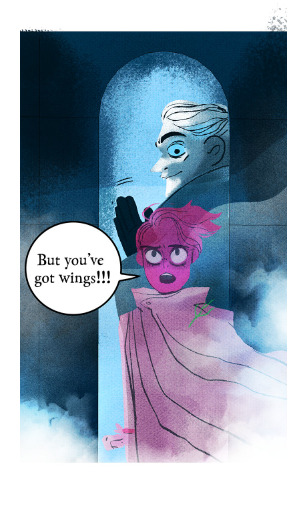
Persephone's ableism aside (seriously, I have legs, that doesn't mean I want to walk everywhere, I also own a car, that doesn't mean I have to drive everywhere, maybe flying is tiring? Maybe he's injured and shouldn't be flying? Maybe he has a disability that results in him having wings that can't fly? Check yourself Persephone 😒) this is one of the earliest signs of LO's "Revenge for Persephone" problem which is CONSTANT throughout the narrative - that anytime Persephone is slighted or inconvenienced in the slightest, then the narrative needs to ensure there's some kind of revenge, either directly for her sake or indirectly for the audience's, and it's often always facilitated through or by Hades.
And that leads us to Episode 39, which is when we get exactly that.



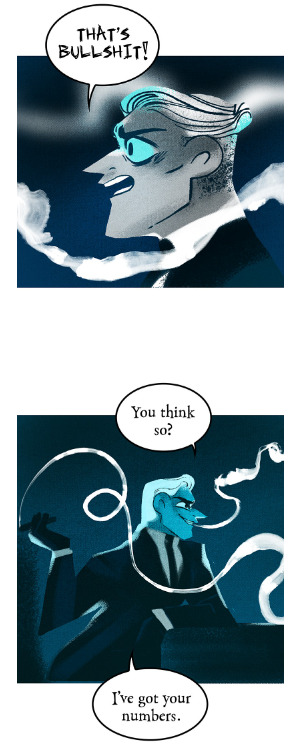
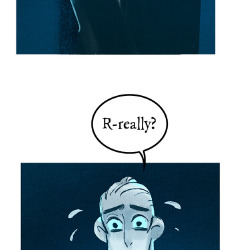
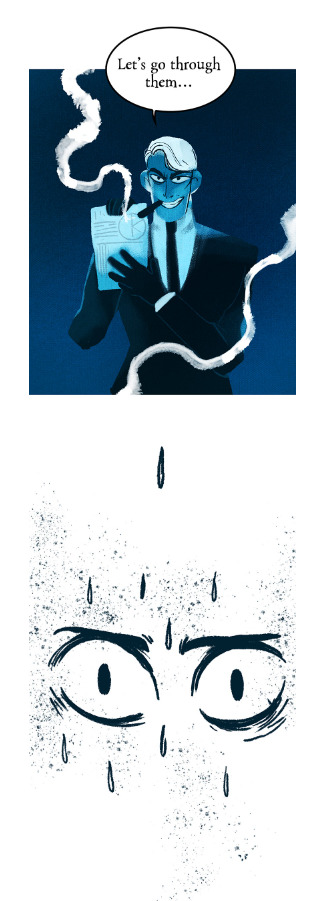
Moving onto the scene itself, this is what we call in the work environment a "dressing down". This is not how legitimate employee reviews are given. Hades is not planning on giving him any sort of formal review or constructive criticism. He's planning on tearing him a new asshole just for the fun of doing so. You can even see it written on his face. He's doing this just for the joy of tearing him down. As someone who's been subject to this kind of behavior in previous work environments, I can assure you that this is not normal behavior that's indicative of a functioning workplace, this is abuse.
Taking that train scene into account, it's a way to indirectly "avenge" Persephone. She was slighted by Thanatos, so now Hades is going to make his life hell. But here's the thing - this not revenge for Persephone's sake. Hades doesn't even know Persephone's in the building, and Persephone doesn't know that Thanatos is being berated by Hades. But the scene is here anyways because of course the audience needs to feel "better" about Persephone getting pushed by a stranger at the train stop.
Now, scenes like this have been done in other stories, often times to explain the behavior of bullies/aggressors/etc. because in many cases, textbook bullies, whether children or adults, are abusing others because they're being abused by a higher authority so they take it out on those "weaker" than them.
But this doesn't work in LO, for several reasons.
First off, it pretty much plays it off like a joke, especially when the scene continues after Persephone has walked into Tower 4.

But beyond that, the higher authority abusing Thanatos is someone we're expected to root for. He's the main love interest. While this could be written as a legitimate character flaw, we all know now, in the year 2023, that Rachel sees Hades' behavior as a feature, not a bug. While most scenes written like this would cast a new perspective on a bully and allow some room for understanding and empathy from the audience, in LO's case, we're still not expected to empathize with Thanatos here, they want us insulting him right alongside Hades.
And of course, that brings us to the big blue elephant in the room - the knowledge of Hades and Thanatos' relationship completely re-contextualizes these scenes in a way that's far too depressing and horrifying for a writer like Rachel to be able to wrap up confidently.
Of course, she tried, but her efforts... can't even really be called efforts. For starters, because a lot of it is played off as a joke, as if Rachel can't handle even a single moment of legitimate emotion, she has to "write off the awkward" by making things "funny".

But when she does try to seriously write these scenes of introspection, reflection, and communication, it just winds up turning into the main protagonists going "woe is me, I was the real victim!" and never actually suffering consequences for their actions as a result as they Gaslight, Gatekeep, Girlboss their victims into apologizing to them. It still isn't asking us to empathize with or side with Thanatos, it wants us to end up right back at square one supporting Hades' side of the story.
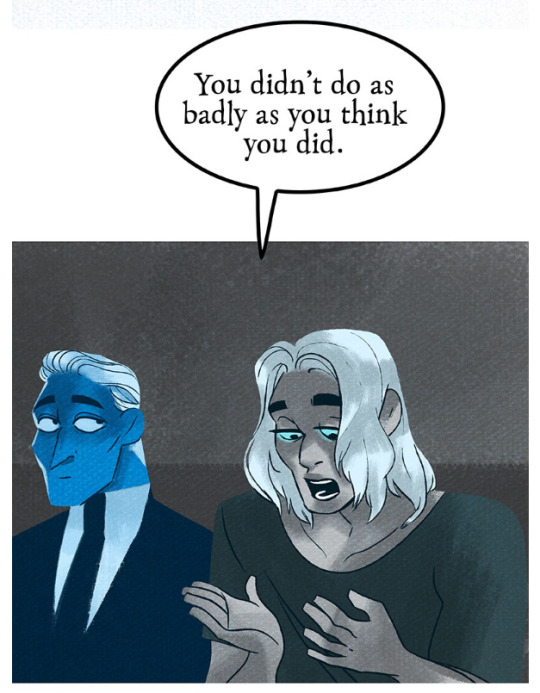


Literally "well you weren't that bad, at least you were there!" bare minimum accountability, followed by "well I didn't make your life easy so I get it" from someone who was literally a child who was abandoned and left to live with an abusive asshole. It wasn't his fault that he was in the situation he was in, it wasn't his fault that he was a "handful" for Hades because he was a CHILD and Hades was the ADULT, but the comic paints it as Thanatos being at fault anyways for being "ungrateful".

But there are even more subtle signs that point to Thanatos' childhood with Hades that, while not specifically mentioning it, do paint a pretty nasty picture of how Thanatos views Hades and the people around him as a result of his childhood, in a very fridge horror "stop and think about it" kind of way.
First of all, the fact that Thanatos hasn't even been allowed to touch Hades' car. Obviously he's referring to specifically driving it but it makes me wonder what kind of bare minimum accommodations Hades made for his own adopted son. Again, played off for a joke.
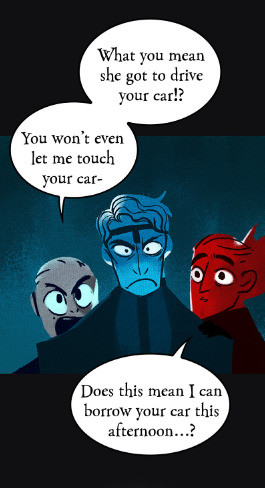
And of course we have this one piece of concept art-
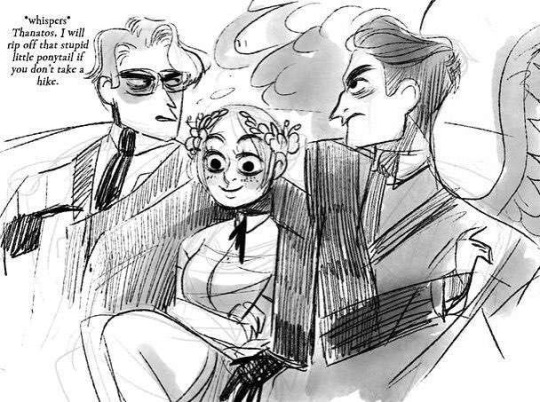
Now to be fair, this is concept art from before it was retconned that Thanatos was Hades' son, but it still casts an icky implication in hindsight both because of Hades' treatment towards Thanatos as well as the implication that Thanatos was getting "too close" to Persephone for Hades' liking. This sort of weird dynamic can be found in the actual comic when Hades admits he knows Thanatos was sleeping with Minthe.

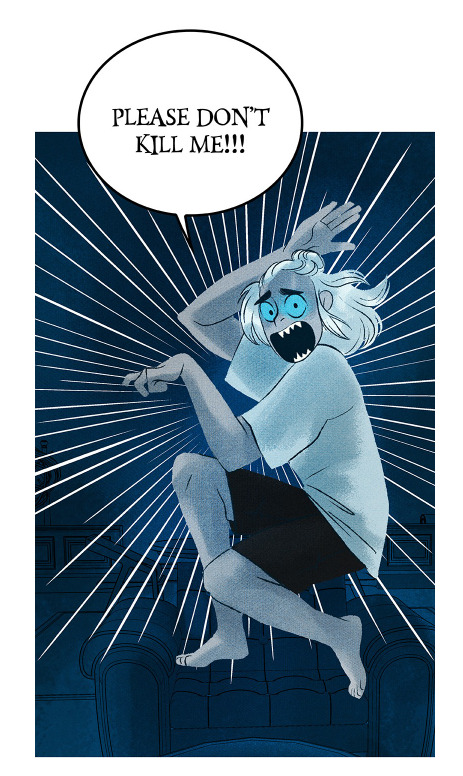

And then there was this one scene, which prompted me to write this post in the first place, shared in the ULO Discord.
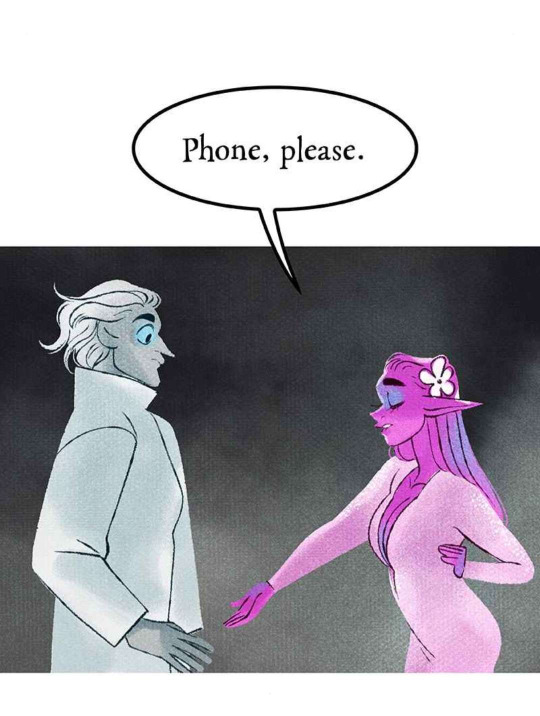
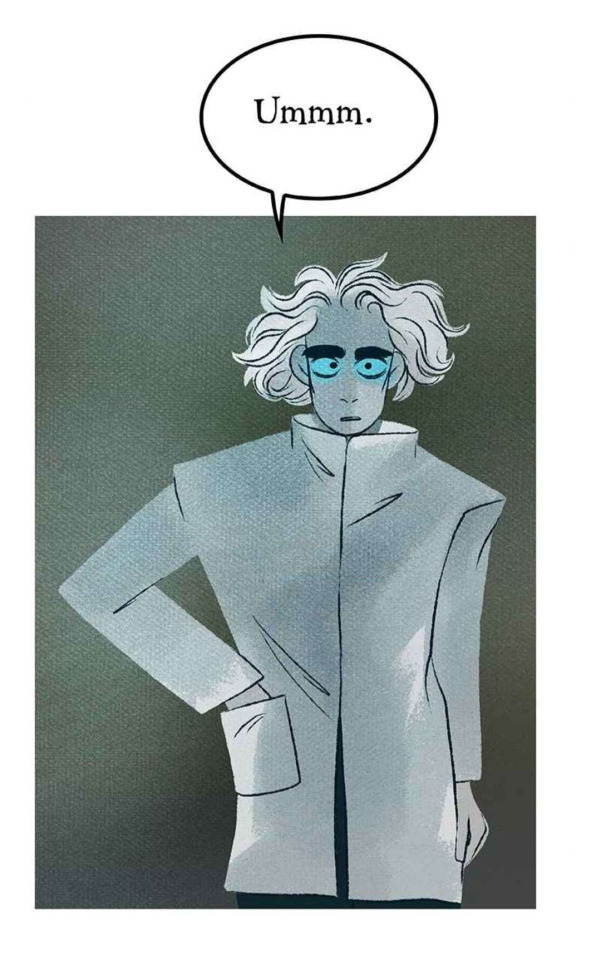
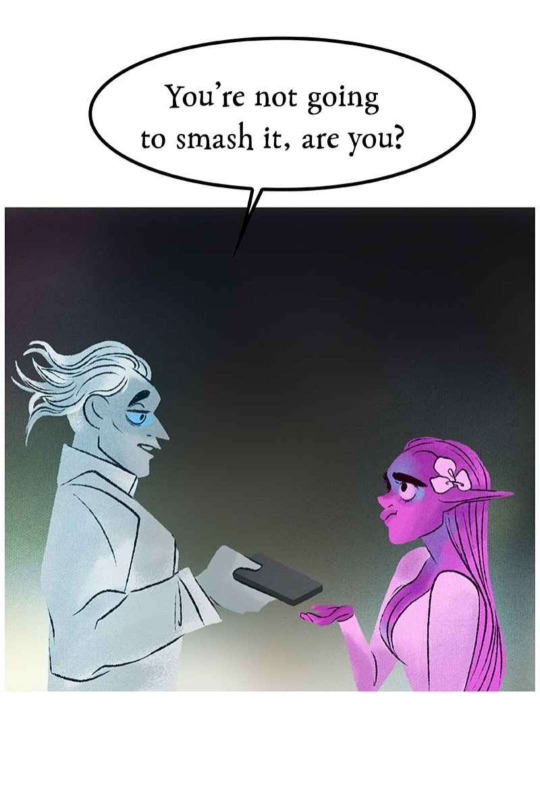
Thanatos has just met Daphne, so it's not necessarily weird for him to be suspicious of her asking for his phone, but the actual dialogue... doesn't line up with what you'd assume he would be suspicious of.
He doesn't say "you're not going to peek through it, are you?"
He specifically says "You're not going to smash it, are you?"
Now, if this line were intended to be anything more than some throwaway "haha funny" line (which, again, where's the punchline here) then maybe it could point more to something that happened between him and Minthe. But there's nothing that implies she was ever violent towards him, and the one time she IS violent towards anyone, it's implied that's the first and only time she's ever escalated things to that point and that even she's shocked and disgusted at her own behavior.

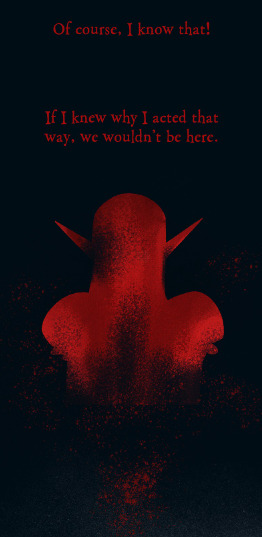
There is plenty to imply that Thanatos was abused by Hades, though.
So reading this line in hindsight... really just feels like further proof on a growing pile of evidence that Thanatos was constantly being berated, controlled, and abused by Hades, a guy who he never asked for as a father figure, but was still expected to apologize to anyways.
But there is one last thing I wanna mention before I wrap up. One thing that was mentioned by yet another user in the ULO community that really stood out to me because it just goes to show how horrible Hades has been towards Thanatos, both in the past pre-retcon and in the present well after it was established that they were father and (adopted) son.
And that's Hades' two dream sequences that involve him having children with Persephone.


One of these scenes is from before the retcon. The other is from after.
Neither one features Thanatos as a part of Hades' visions for the future.
Hades has been Thanatos' entire life. But Hades doesn't see Thanatos as even a part of his.
#lore olympus critical#lo critical#antiloreolympus#anti lore olympus#essay post#long post#content warning#cw#child abuse#child neglect#tw child abuse#tw child neglect
413 notes
·
View notes
Note
Bravo to you for choosing not to let Rem be forgiven so easily. Honestly I've never been a big fan of Rem as a character, sometimes her endless pandering and obsession with subaru just really annoys me instead, and I've never understood people looking at her doing all that and then saying “Wow that's so hot I'm so jealous of Subaru!”
As for the ones who want her deeds to be easily forgiven by everyone, my personal guess is that they all only care about her body and the unheathy way she forces herself to act like the perfect waifu just for Subaru's sake, but subconsciously they can't stand the shit she did either, so they secretly want their favorite waifu to be a perfect being without flaws. But to me, isn't it essential to love a character and accept their flaws as well? They did wrong things, but there's no doubt THEY did them anyway, and that is part of what makes them who they are. Another thing is that forgiveness has to be earned, we're not cruel, coldhearted, or closeminded for not forgiving someone who hurts us. So I too agree with that anon who thinks WHDAA cast need to to beat some sense into Subaru on way too forgiving and tolerating the people who have hurt/killed him.
But now that you've decided to do that, beware of those rabid Rem stans coming after you and I'm worried that their harassment goes overboard and affects your personal life
I will say — I believe that Rem and Subaru’s canon dynamic is one of the most intriguing and multifaceted dynamics in the entire series. Their parallels regarding their insecurities and family members, their mutually codependent tendencies, the way they run the risk of becoming each other’s perfect enablers, the genuine sense of love and affection that runs parallel to the unintentional toxicity fostered within their relationship — it’s all really interesting stuff. In fact, exploring their dynamic through the lens of outsiders (including amnesiac!Rem) finally getting to peer under the hood is one of the main reasons I wanted to write a react fic at all.
As for why people like her — honestly, I think it’s kinda easy to guess? She’s a very cutely designed anime girl, she’s incredibly well-voiced, her insecurities are genuinely relatable, she’s got a super awesome oni power-up transformation, her morning star lends itself to some of the best choreographed action scenes in the series (or at least Season 1), she appeals to the whole “submissive maid” aesthetic that she knows Subaru finds attractive (and that also appeals to the target demographic of Re:Zero specifically, let’s be real here) — and frankly, there are so many scenes in anime where characters we’re supposed to like do fucked up shit that it’s not difficult to just…gloss over the whole “tortured the mc for several hours” part of her character. It’s understandable, especially if you’re not an insane person who spends all their time hyperanalyzing the anime they’re a fan of like I am. I don’t think it’s really that far of a leap for her to develop such a massive following, she was basically designed to be as popular an anime waifu as physically possible.
But then, that clash can become…a little uncomfortable if you’re writing a story where “Rem tortures Subaru” is a major plotpoint, and if you don’t want to reevaluate their entire relationship, it makes sense to find a way to just — get the characters to move along, much like a lot of the irl audience does.
But I really like toxic characters and angst and complicated relationships and all that fun stuff, so that’s what I’m gonna focus on. —Also Rem is WORSE in the LN. Girl starts fantasizing about whisking Subaru away while he’s practically comatose from shock (second Arc 3 loop) and then also makes a comment like “even if he had tried to assault her in her sleep, she knew she never would have resisted” like GIRL??? The idea of not tapping that insane well of potential drama is ludicrous to me lmaoo— especially because I really don’t care about maintaining the status quo ;)
(Also frankly, anyone who would start seriously harassing me over whether or not I share their opinion about a fucking anime girl is too pathetic for me to care about. I honestly don’t think I’ll get that big of a response — especially not on Tumblr “Gay Website” Dot Com — but even if I do…I don’t care, lmao.)
45 notes
·
View notes
Text
2024 fic roundup
Can I just create an ask game? I wanted to create a snapshot for 2024 for me, and would love to hear from others, so I’m going to interview myself like a loon.
Please join in if you want 🙂 I know we’re in Dec, so feel free to answer at the end of the month if you wish!
What fandoms do you write in?
Good Omens! Aziraphale/Crowley!
And I wrote one for the tiny fandom of The House in the Cerulean Sea. Linus/Arthur 4ever.
How many words have you published in 2024?
This is a tricky one. My official total is 270,737 words but three of those were collabs. So if I count the fics that only I wrote it’s 117,911. Which is still a bit mind-blowing to me, as I only started doing this Nov 2023.
What is your greatest achievement this year?
It has to probably be my first ever longfic over 50k. I set myself a goal to write something long and follow the beats of a classic romcom. And I did it! It was really me muddling through it trying to work out what the Hell I was doing. But it exists and some people even said they liked it, so I count that as a win.
It’s called The Apple Doesn't Fall Far and it’s about Crowley inheriting a cottage from his aunt and butting heads with Aziraphale the councillor who is in charge of knocking it down. And spoiler alert. They fall in love
What are your favourite top three fics you wrote this year?
The Apple Doesn't Fall Far - as above!
Rating: E
Wordcount: 58,135
It’s sugary sweet with enough light angst to create some nice drama. But it’s mainly cosy, low stakes, comfortable, contemporary British romance vibes.
The Ecstasy of Eden
Rating: E
Wordcount: 28,303
5 times they used sex pollen, and the one time they didn't Through the Ages fic. Written for the High Sex Pollen Event. It is a fun romp through the ages with some surprising angst chapters that I absolutely love. They are silly piney fools. ALSO I got art made for it!
If we were
Rating: E
Wordcount: 3,362
In 1941 Aziraphale and Crowley imagine their life as humans.
This fic fell out of me almost fully formed. I was half asleep and began daydreaming fic (as you do) and by the time I got to my laptop, my fingers wrote it in basically a couple of hours. It is everything I love. Bittersweet, yearning, them being completely in love but unable to do anything about it, slow dancing, almost kisses and some spice!
What was your biggest pit of despair moment?
The Ecstacy of Eden was a slog at times. I had written chap one and three, but it took so long for me to get chap two into shape. I couldn’t work out what the Hell I was doing. Got beta feedback where they could tell I was clearly feeling really stuck after I wrote it because it was all a bit lacklustre.
Almost totally gave up. I had a few: I’m never writing again, what’s the point? moments.
Somehow I pushed through and made it work.
In a lot of ways, that was probably the moment I saw my writing improve the most. BUT IT WAS A HORRIBLE SLOG. Ugh. I wanted to say this because I know we all have them and it’s good to talk about it!
What have you learned?
Honestly, how to use commas better! I can already tell my grammar has improved a lot from when I first started. I don’t rely on epithets as much. I know what semi-colons are for (thanks @fishey-me!)
I am getting better at letting fics breathe. I feel like my background in marketing and comms makes me want to write very precisely and I am slowly learning to cast that off and take time setting scenes. I also found a few tools to help me outline better.
Romancing the Beat by Gwen Hayes
Take Off Your Pants!: Outline Your Books for Faster, Better Writing by Libbie Hawker
They’ve been invaluable in teaching me what the Hell I’m doing. My main takeaways - work out your character's flaws and work out the theme of the story.
I also learned what sex pollen is and then wrote a 30k fic about it.
What fic did you want to do but never made it off the ground?
Ugh, I have one in my drive called Crowley and Aziraphale go on holiday. I imagined it as a canon-compliant fic post S2 where they go on a sort of make-or-break holiday. I just liked the idea of Crowley being all grouchy in the sun and Aziraphale awkwardly trying to flirt over Sangria. ALSO only one bed! But it sort of sits in my drafts and I’ve not done much with it.
Did you beta any fics? Any favs you want to shout out?
YES. Many fics!
But I think I’ll have to give my biggest shout-out to @kneelbeforeyourdogbabylon for Sins of Knowledge! I’ve help beta more than 100k of that (wow) and it’s a wild ride. Go check it out.
What three fics have you read this year that you love?
Listen I have tons and tons I’d love to recommend, but I am going to whittle it down!
First up it has to be @happynachohologram who surprised me on my birthday with not only their first ever fic, but basically one of the best South Downs retirement fics ever. I still think about it. It’s under 2k and it’s absolutely beautiful.
The Best Part by @happynachohologram
Rating: E
Wordcount: 1,702
A throwaway comment from Aziraphale sets Crowley wondering about the best parts of retirement.
-
UGH, next up @gaiaseyes451 This fic changed me. I don’t know if I’ve ever been more hooked while being emotionally devastated as this fic. Mind the tags but it’s wonderful.
A Little Life by @gaiaseyes451
Rating: E
Wordcount: 71,624
When Professor of Botany Anthony Crowley met bookshop owner Ezra Fell one November afternoon both knew their lives had irrevocably changed. From that moment forward, Anthony and Ezra’s existence was intertwined. Their story was written in the moments and memories they created as they moved through life’s chapters of coming together, building a family and facing the challenges of being human. This is a story of unconditional love and the joy and humour, obstacles and grief that inevitably come with choosing the same person, day after day, over and over and over again.
-
Gorgeous pine-scented Crowley and one of the best premises I’ve read in a while. I know most people must have read this but if you haven’t you’re in for such a treat!
Stuck on Me by @zin-lynn-c
Rating: E
Wordcount: 56,538
After a drunken handfasting ceremony goes awry, Crowley and Aziraphale find themselves magically bound to be touching at all times. In order to set the situation to rights, they must embark on a multi-day journey to seek help from the last true witch in England.
What ideas are percolating for next year?
I think my next longfic is probably going to be a road trip with college-aged Az and Crowley. The characters keep yelling at me in my head, so I think they want to be written. So far Crowley is an activist punk who needs a lift back to London after graduation and Aziraphale is a posh boy who represents everything Crowley stands against.
Animosity to lovers my beloved!
It’s probably set in the 90s so no one has a mobile phone and Crowley can be obnoxious with a box of cassettes playing Az a bunch of bebop he pretends to hate. I have a scene of Crowley taking Aziraphale to his first gay bar in my head that I can’t get rid of, so I probably need to write it.
Who do you want to thank?
OMG all of @goodomensafterdark for giving us a platform and being a lovely bunch of pocket pals! I want to give A BIG shoutout to @happynachohologram for letting me yell all my insecurities at you and for always screeching when I send them pictures of Crowley and Aziraphale holding hands in the South Downs.
And to @kneelbeforeyourdogbabylon for agreeing to beta my 50k longfic! Pretty sure it would never have been published if it wasn’t for you two.
And @doonarose for organising the madness of the original CYOA!
Anyone in my tags feel free to join in or in fact anyone at all. I'll tag a few more below. Tag, answer any Qs that suit and play along!
@adverbian @isiaiowin @onedappercat @angie-words @brenna
40 notes
·
View notes
Note
If you gave Chloe a redemption how would Zoe fit? Not Vespera just Zoe...
I discussed this in more detail here, here, and here, but canon Zoe has all the hallmarks of a Mary Sue. She shows up out of nowhere in the middle of the show and immediately becomes close to the main cast. She has no real flaws. Everyone loves her. She gets a romance arc with the main character. She's the only person other than Adrien to wield the black cat miraculous. You get the picture. She's the kind of character I expect to see as an OC in a fanfic, not an actual character in canon.
While I will defend the rights of Mary Sue's in a general sense, a Mary Sue has no place in Miraculous canon. It's the wrong type of story for an idealized self-insert that the audience can project themselves onto for many reasons, chief of them being that those types of characters only work as main characters. This makes it impossible for me to use Zoe as-is. I'd have to completely redesign her character so that she had depth and flaws and I have no interest in doing that.
It's not that I hate Zoe, it's that she has no reason to exist outside of being Chloe's perfect replacement. Take away that role and what is she even doing here? What purpose does she serve that you can't give to one of the twenty other teenage characters that canon already introduced!!! And that's not even counting the specials which introduced another three for some reason. Writers, what are you doing? Stop adding characters!!! You need depth, not breadth!!!
In theory, Zoe could be used as part of Chloe's redemption, but that would require them to have an actual bond. As best I can tell, in canon, Chloe and Zoe didn't meet until the start of season four. They're sisters in the biological sense, but that's about it. This once again makes it hard to see Zoe as value added.
If the Kwamis didn't exist and Zoe was Chloe's cool older sister, then she'd have some potential as Chloe's mentor, basically taking on the role I see Pollen in. She'd also have potential as a significantly younger sister who adores Chloe, making Chloe act nice because she wants to keep that adoration. But Zoe is none of those things. She's basically the same age as Chloe, Chloe doesn't care about her, and Adrien already fills the role of Chloe's same-age sibling who grew up in a different home, so why would she need another one?
Another theoretical path for Zoe would be to let Chloe redeem Zoe. We know that Zoe was a massive liar in the past. If she was introduced while still in that phase, then redeemed Chloe could show off her new skills by helping her sister. It would even give you a nice way to address how messed up their mother is.
As nice as that may sound, I still wouldn't go there unless Chloe was my main character. Zoe's redemption just eats up way too much screen time as you have to establish who she is, give her a relationship with Chloe, and so on. Not a quick little addition to the script and not worth the time when her only purpose is fleshing out Chloe. There's also the Sabrina issue. If Chloe is going to redeem someone, it feels silly to add a whole new character when you have an established character right there, ready and waiting. Writing wise, Sabrina feels way more like Chloe's sister than Zoe ever did so why add Zoe?
No matter what way you look at it, canon Zoe just isn't needed. There are no missing roles that she's ideally suited to fill. You'd have to totally redesign her to make her work and, at that point, you're not using Zoe, you're using an OC with the same name.
42 notes
·
View notes
Text
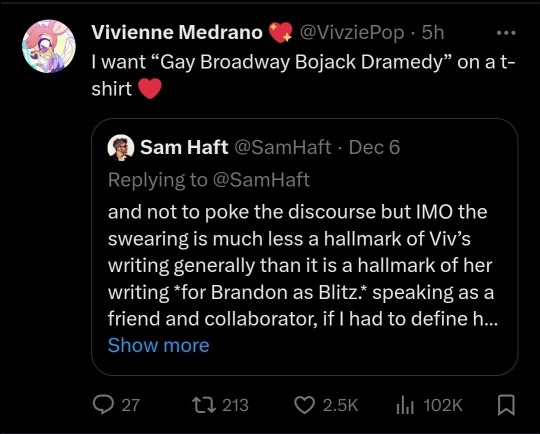
YOU DIDN'T WRITE ANYTHING SIMILAR TO BOJACK BRO! BH has so much structure and essence, it is insane. Specially after S1, the intelligence in those BH scripts is nowhere to be found in HB. In helluva, There are these tiny good things that get murdered every other episode. Things that sound better as concept-than how you developed it. There are so many great jokes that aren't based on saying "dick dick whore fuck", so many of their animal characters work for actually smart animal jokes. Or the tongue twisters! YOU BARELY LET CHARACTER BE BAD PEOPLE. Every social issue they suddenly have a sad pass and their dad was mean and that JUSTIFIES EVERYTHING? Bojack H literally goes against that so hard is impossible you think this way if you understood Todd's speech, or Bojack's interview or the last two fucking episodes of the series. All the main cast also feels almost empty of bad qualities that aren't uwu justified by the plot and writing. Certain things stop just being explanation of characters and how they came to be. It sounds more like you gave your characters a bunch of shitty we are in hell traits + things that you didn't even recognize as problematic. AND TRIED TO SAVE THEM IN THE WRITING as just flaws- or making something else happen to the character to be like "Oh they have it so difficult! They just didn't get taught how to love right" When they are being abusive toxic fucks instead.
I legit believe all of Herb story had something so strong to say about queer issues, then Helluva. Like he literally comes out to BJ, kisses him later on and immediately dismiss it. -And then he gets arrested by the police for having gay sex -as public indecency. Many conservatives complain about it cause Herb ran the Horsing around show, saying "it is a show for children people like him shouldn't flaunt around their alternative lifestyle and ruining America"
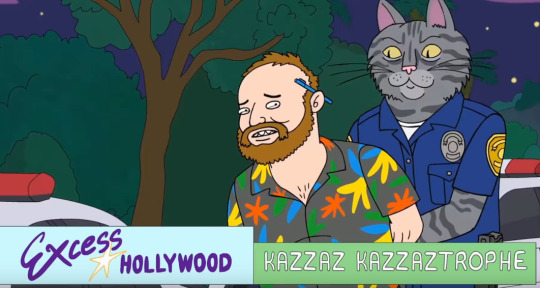
(Read the sings LMAO) All of this in the 80s to 90s

Also, this guy's comments
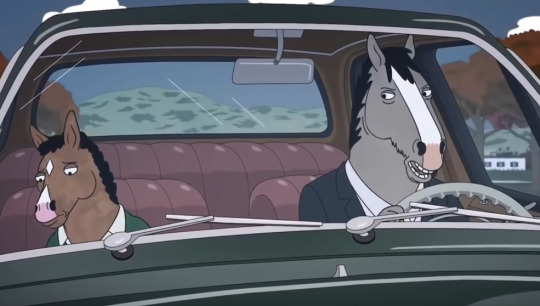
"So, here I am, being your mother, which I know is giving you all sorts of mixed-up ideas about gender, while your brain is still loose and stupid. Just remember, if you become a queer later in life, this isn't my fault! Don't you sing no songs in your nightclub act called, "My Daddy was My Mommy," while gazing longingly at a tangled string of pearls... Pearls are for ladies, Bojack. Pearls are for ladies."
AND THIS GUYYYYY HELLO? They have multiple episodes, including Todd's sexuality- but not all the episodes nor his personality revolve around that! He even made a dating app for Ace people with his girlfriend!

I already have 3 "Bojack Horseman > Helluva Boss" post in this account!
285 notes
·
View notes
Text
Okay. I am annoyed by the everything so I’m gonna go ahead and debunk all the arguments against the Francesca X Michaela storyline.
In case you weren’t aware of all the complaints going around, here they are:
they’ve completely changed the storyline from the books! francesca’s infertility storyline was sooo important and now it won’t happen!
eloise would’ve made more sense as the queer bridgerton, her and cressida or some other female character would’ve been great over francesca.
by immediately making francesca attracted to michaela they downplayed john and her’s relationship that was built up this season, they cheapened the book storyline into a cliche love triangle!
michael was the best book hero ever! I can’t believe they’ve changed him to michaela.
I am taking all these criticisms/complaints at face value and ignoring any lesbophobia undertones (for now) just to prove how flawed they still are on their own.
Firstly, saying that Francesca’s infertility storyline has been ruined is far from the truth. Instead it can be done in a different way. Think about Francesca in a queer relationship and wanting kids in the kind of society she lives in. It basically mirrors the infertility storyline from the books except her struggles would become representative of the struggles that queer people who want kids face. If they went for this storyline in her season, I think it would be really really nice, we’ve seen a straight infertility storyline play out so many times, this would be great.
Secondly, I am so tired of hearing that it should’ve been Eloise over Francesca. I don’t think Eloise would’ve made more or less sense as a queer women. I think any and every character has the potential to be written as queer or straight. Being an outspoken women with little interest on marriage shouldn’t make Eloise more queer. I also really liked the idea of a potential Eloise X Cressida romance but that does not mean Francesca cannot be queer. In fact, I’m excited to see this introverted autistic queer girl rep! Francesca, go prove we exist.
Thirdly, Francesca’s season hasn’t even happened yet! Getting mad over one scene of Michaela, saying that John and Francesca’s relationship has been downplayed and that we’re in for a cheapened love triangle story is so unreasonable. It was a single scene and people are choosing to get mad over something that hasn’t even happened yet? Besides, if this storyline plays out, it wouldn’t mean that Francesca shouldn’t have been made queer but simply that the writers didn’t write the storyline to your liking. The fact that there’s this much outrage over this is so ridiculous to me. Wait till her season. We have no idea how they’re going to play out the storyline just yet so stop hating already (there may be some lesbophobia implications to this claim which I have spoken about below).
Fourthly, I know it’s not a nice feeling to not get the chance to see a beloved book character onscreen due to this gender swap. It may feel unfair but I mean but…give Michaela a chance? We haven’t seen her personality yet and we don’t know how Masali will bring her character to life. If your qualms are that the love interest is no longer a guy you can fetishise and fawn over, then well…log out of the internet, rant to a friend and stick to the books. Let the sapphics have their wlw romance that we rarely get these days because we keep getting cancelled since streaming services hate gay women. And no that is not an exaggeration but our plain reality. So let us have this.
Finally, to end things off, let us address the lesbophobia aspect to this separately because it is 100% worth mentioning.
The treatment towards queer women onscreen is hardly the same as the hype around queer men.
We can see it in the way streaming services and the internet hype up gay romances whilst sapphic romances are largely ignored and cast to the side (just to make it clear I have nothing against people enjoying mlm romance I enjoy mlm romance all I’m saying that it’s a real shame that wlw romance doesn’t get the same amount of appreciation).
The response to Francesca X Michaela has been largely negative and it’s frustrating. Outside of the cosy gay rabbit hole that tumblr is, there’s just outrage over this storyline/pairing for a number of different reasons that well…all feel ridiculous.
Bridgerton has gone off the books many times yet there’s more outrage than before when it comes to Francesca X Michaela?
Fans are getting a lot more defensive of John and Francesca’s relationship despite knowing he was never going to be endgame all because of Michaela? I’m sorry but I’m sure that if Michaela was Michael and we got the exact same scene with Francesca, do you think there would be as much outrage over John and Francesca’s relationship being downplayed? No. Let’s be honest. People wouldn’t be as mad because there’d be an attractive man involved.
I think the sapphics deserve so much more and better treatment from fellow non-sapphics. Instead of a show of appreciation, we keep getting unreasonable amounts of fire onto this storyline that hasn’t even happened.
What’s worse is that I know that Francesca X Michaela’s romance could follow the story beats of previous seasons that were eaten up by fans and still be bad to people because sapphic romances are just judged more harshly as straight audiences refuse to connect with them. If their romance isn’t phenomenal and just good, then it won’t be enough which is just frustrating.
So yeah, the hate towards Francesca and Michaela is unwarranted and unjust. People need to calm down and realise that their claims are contributing to lesbophobia whether they realise it or not.
#all this hate on pride too smh#bridgerton#bridgerton spoilers#francesca bridgerton#michaela stirling#francesca x michaela#lgbtq#wlw#bridgerton season 3
66 notes
·
View notes